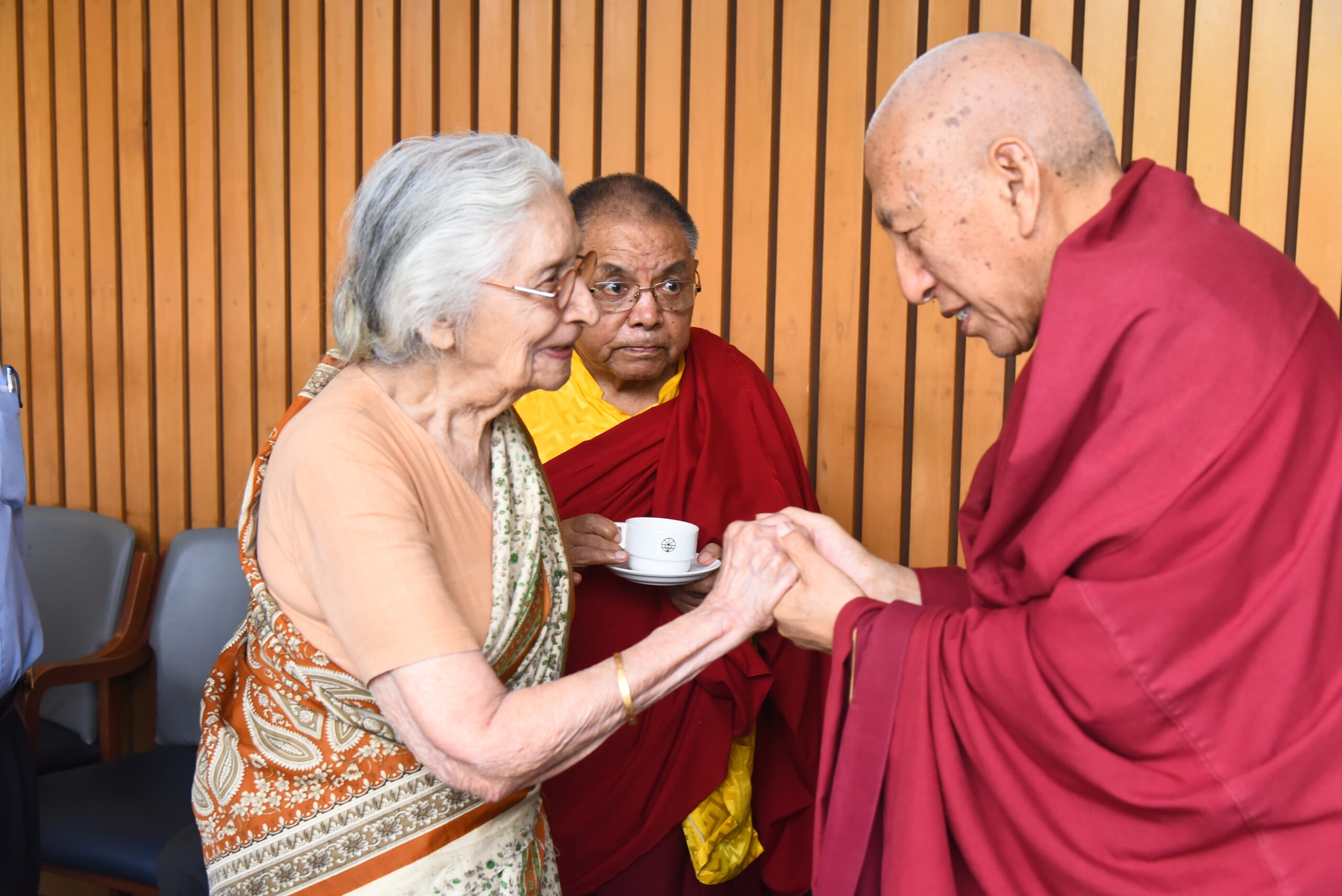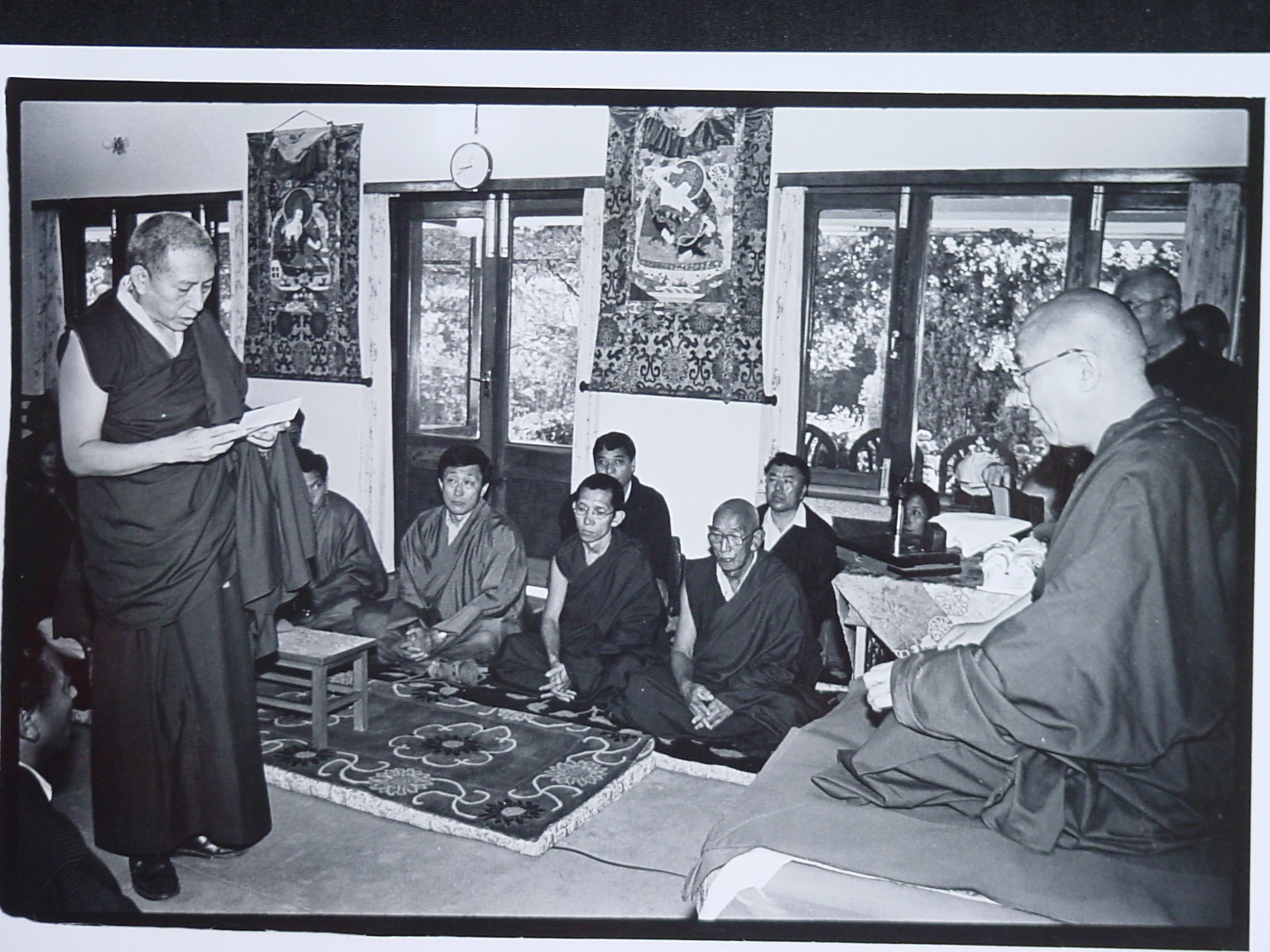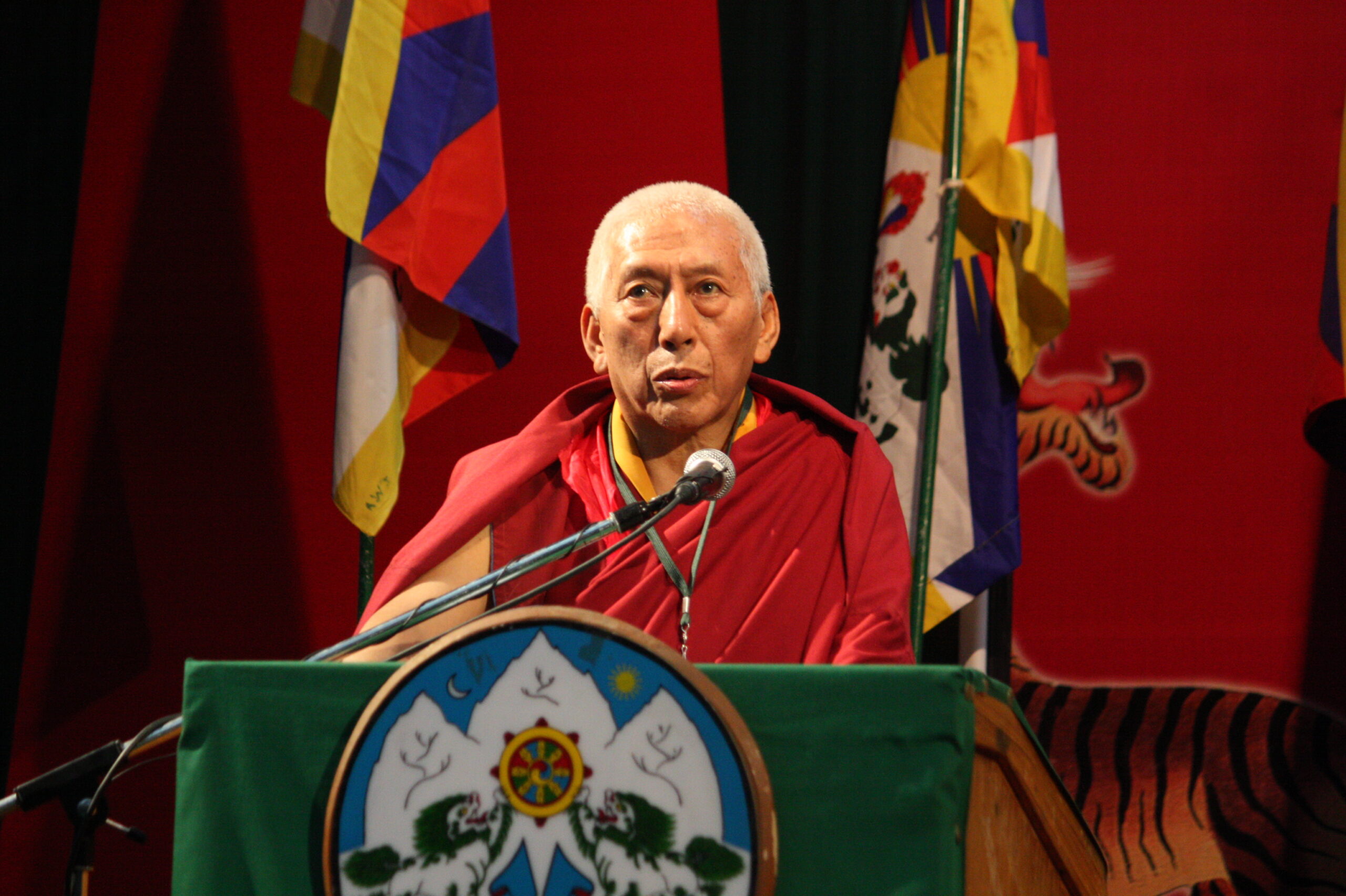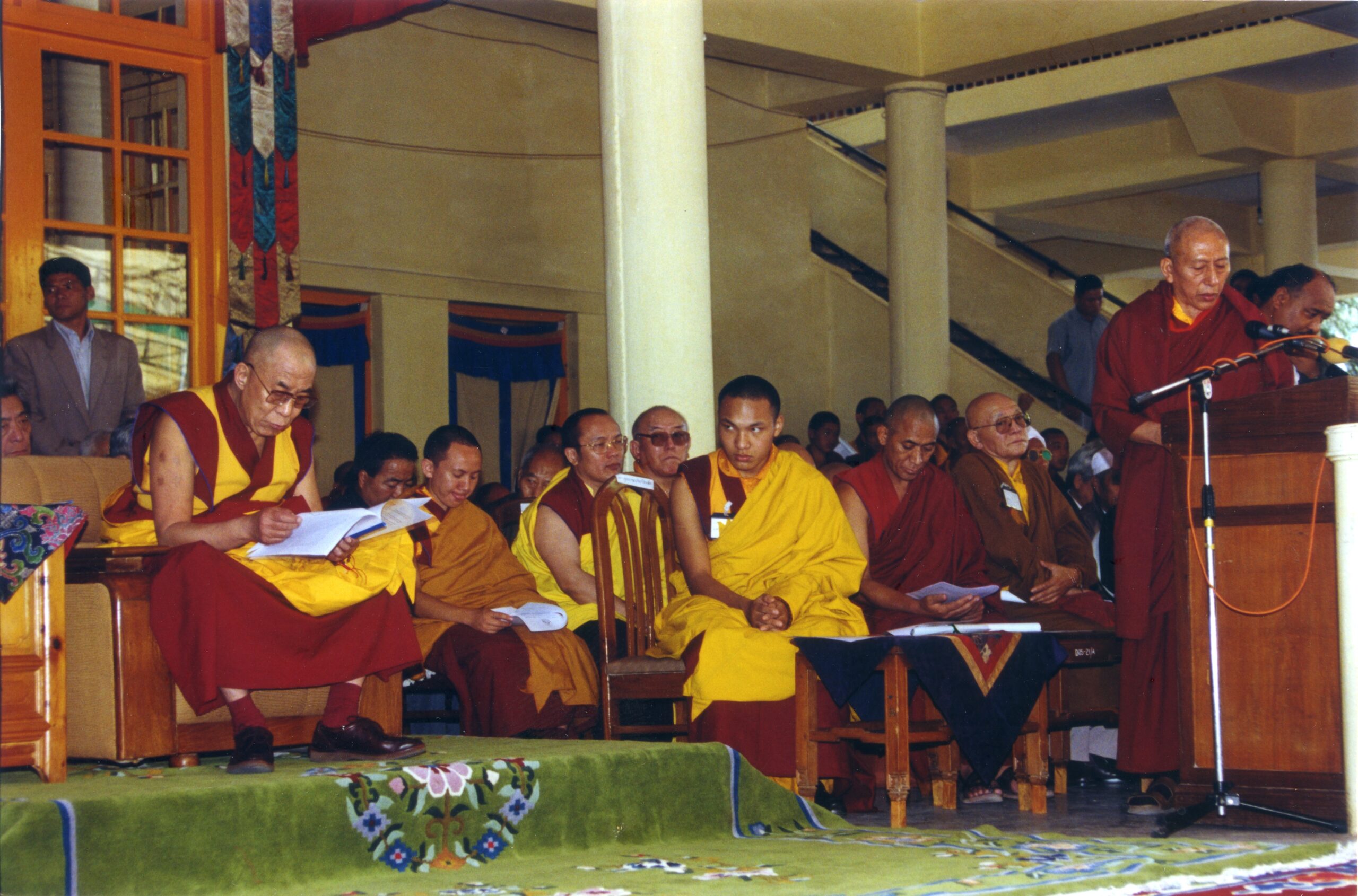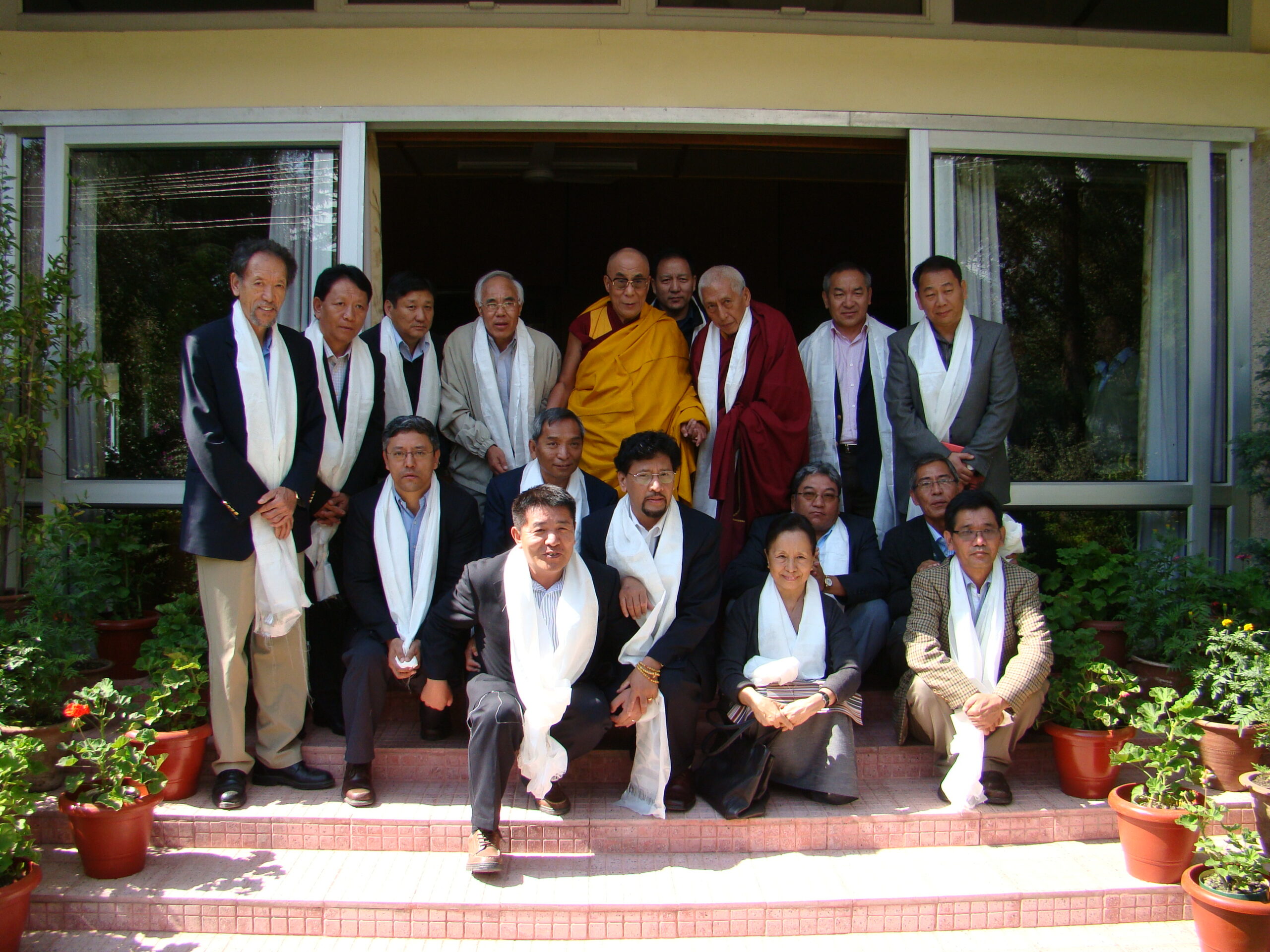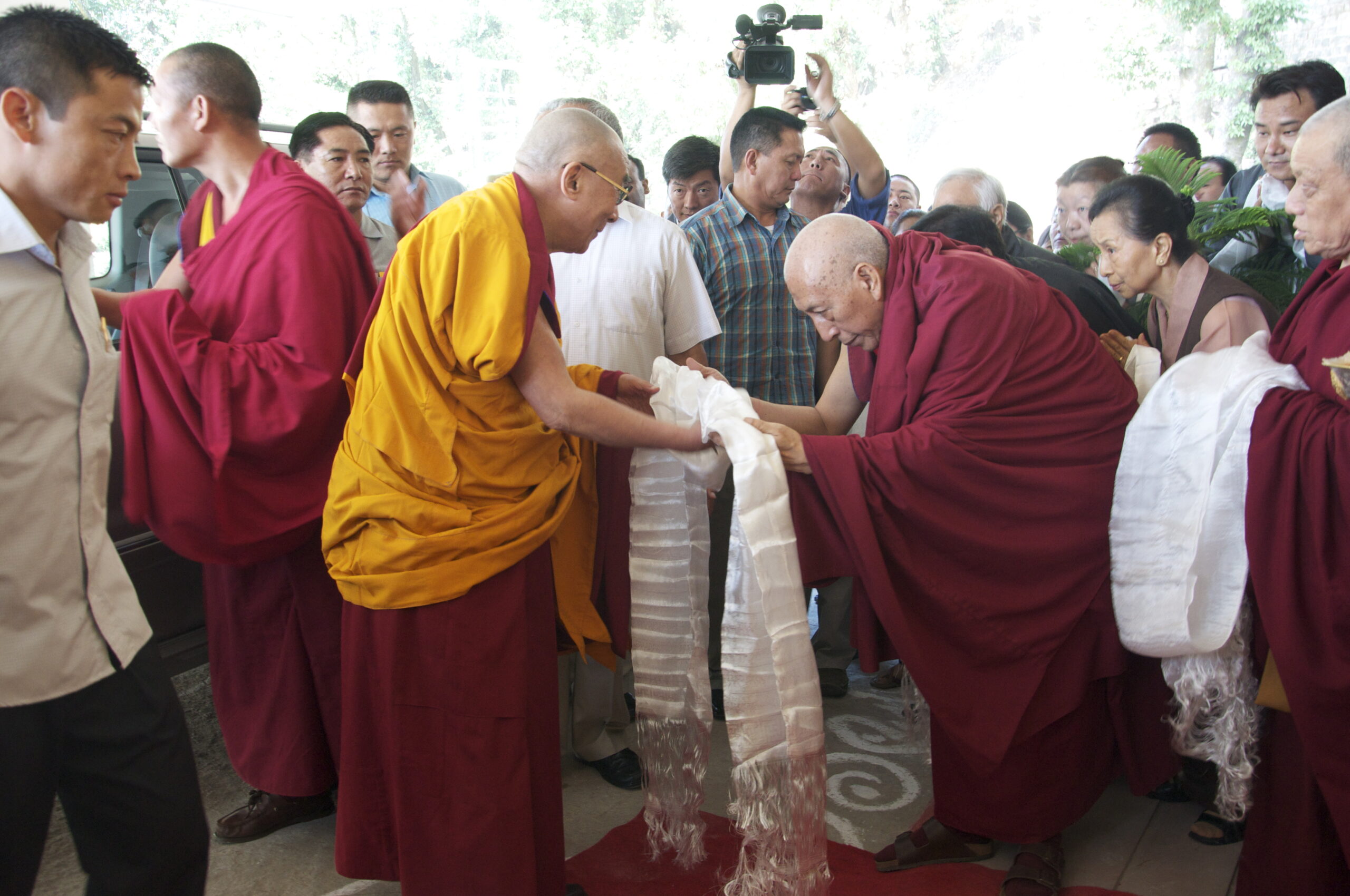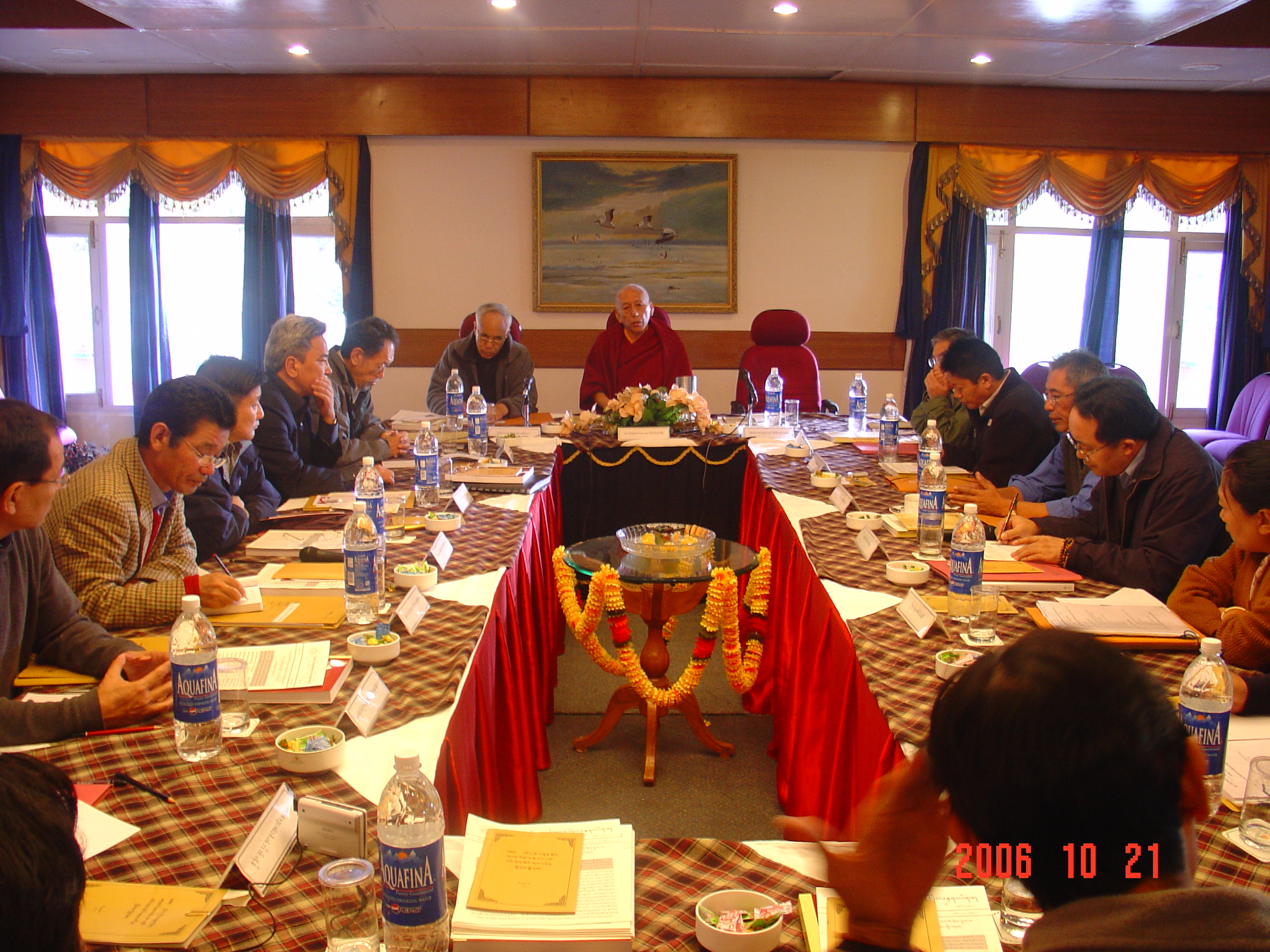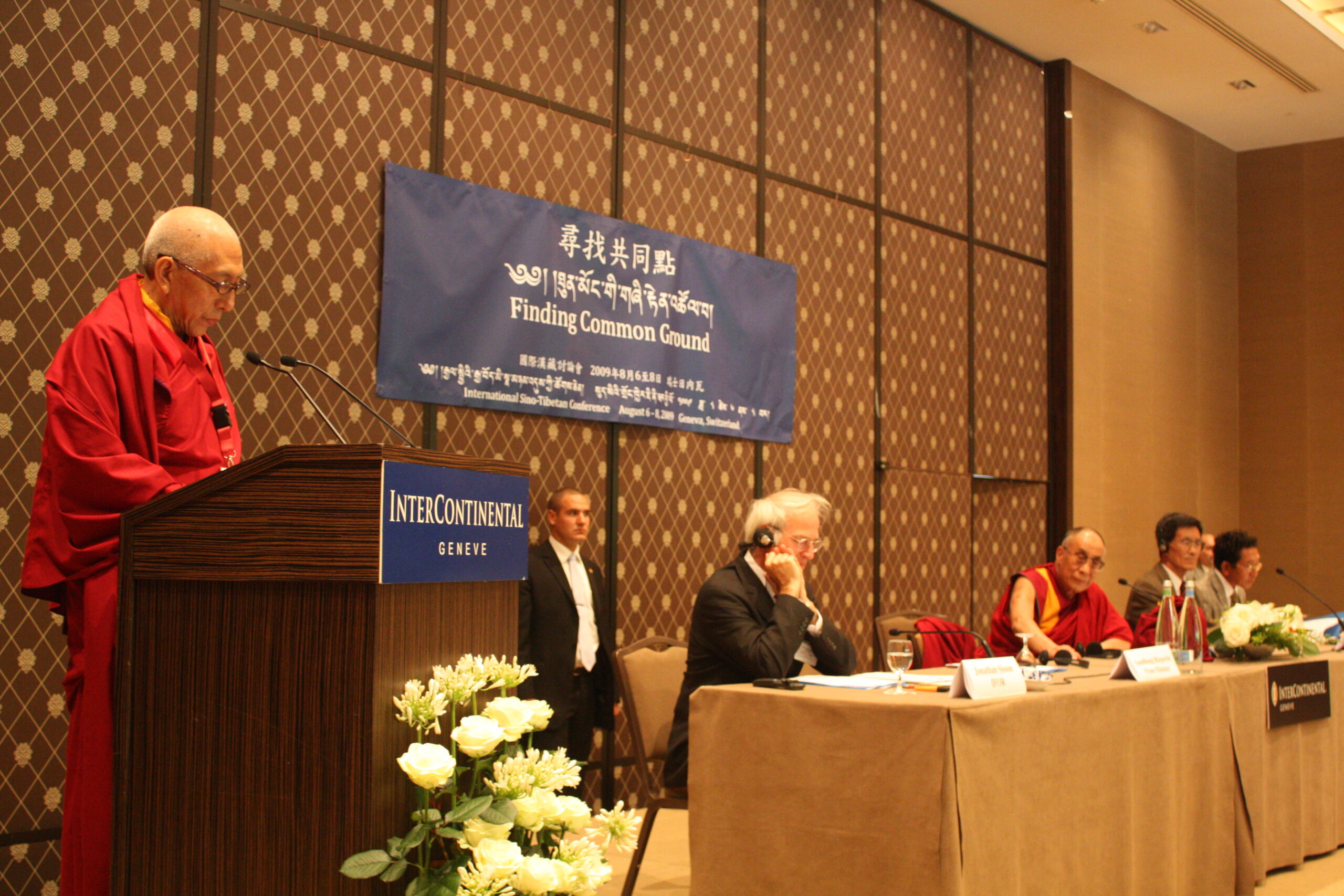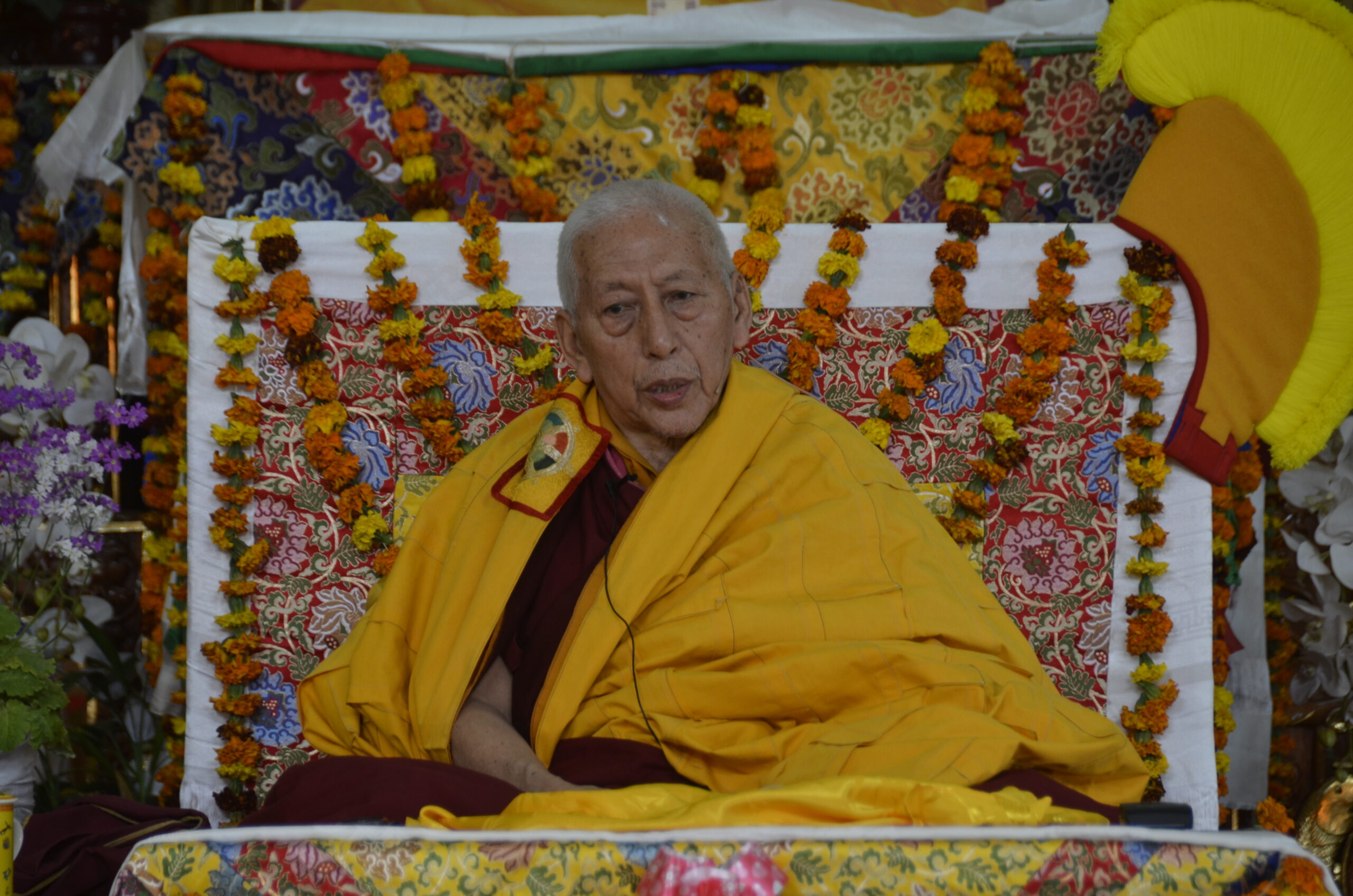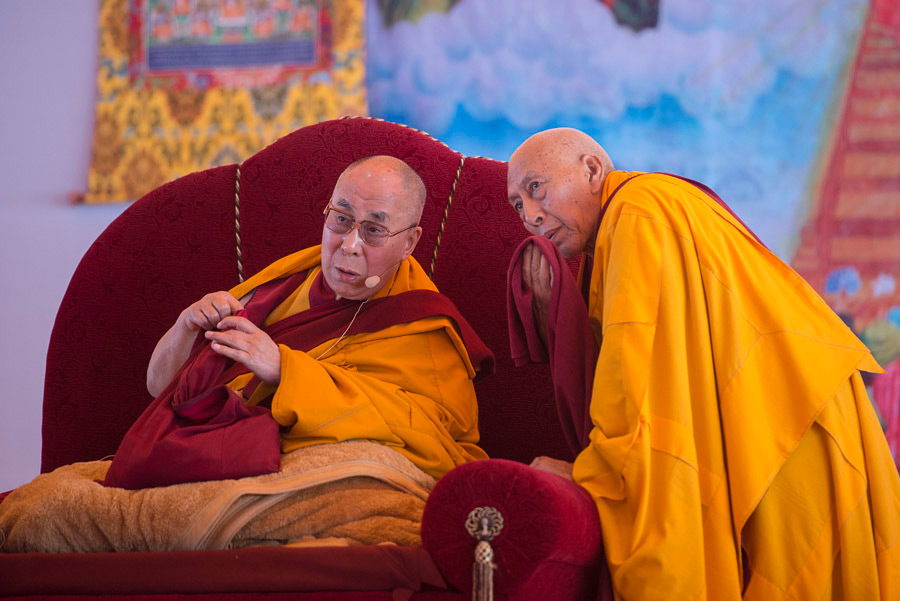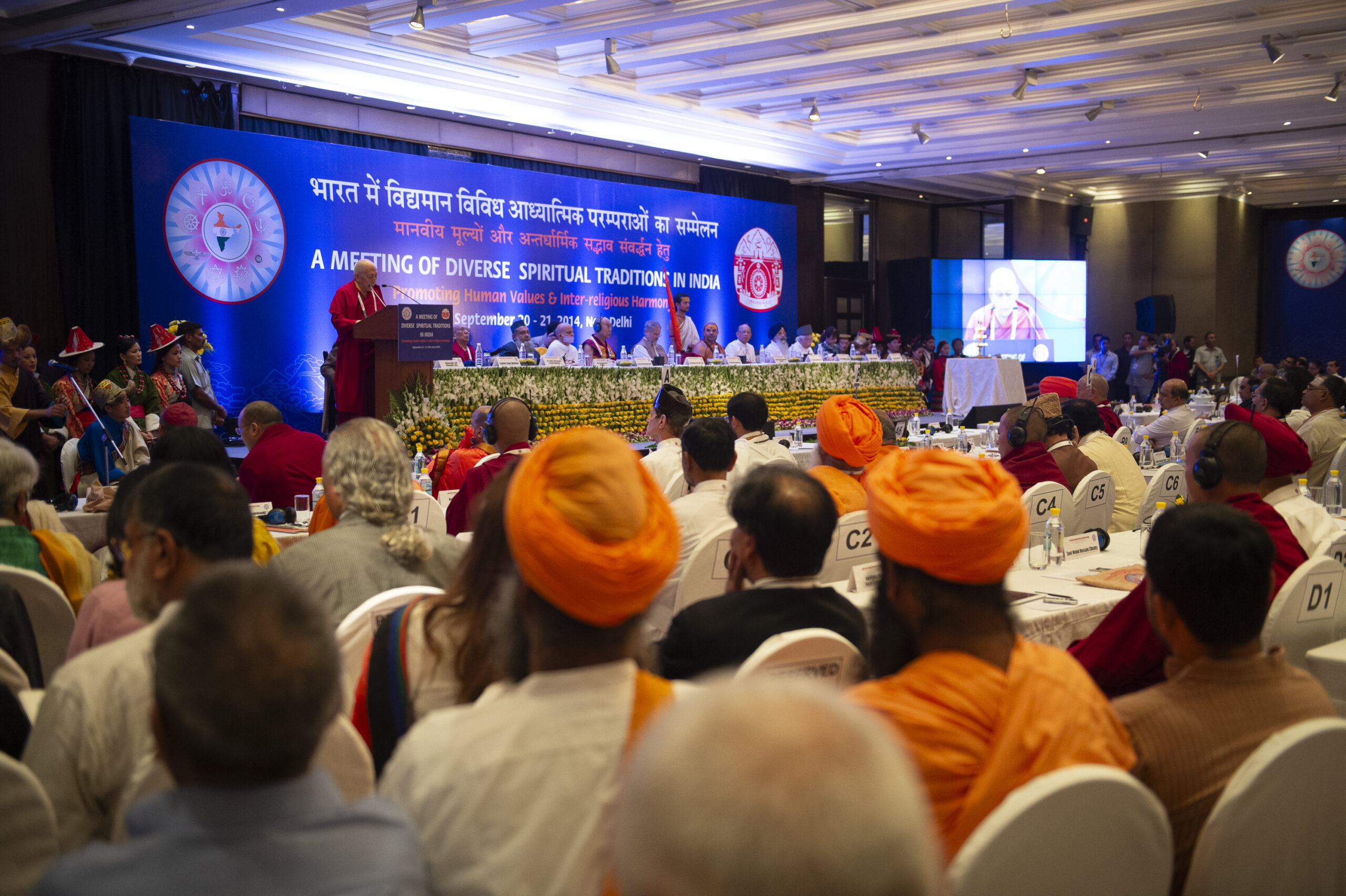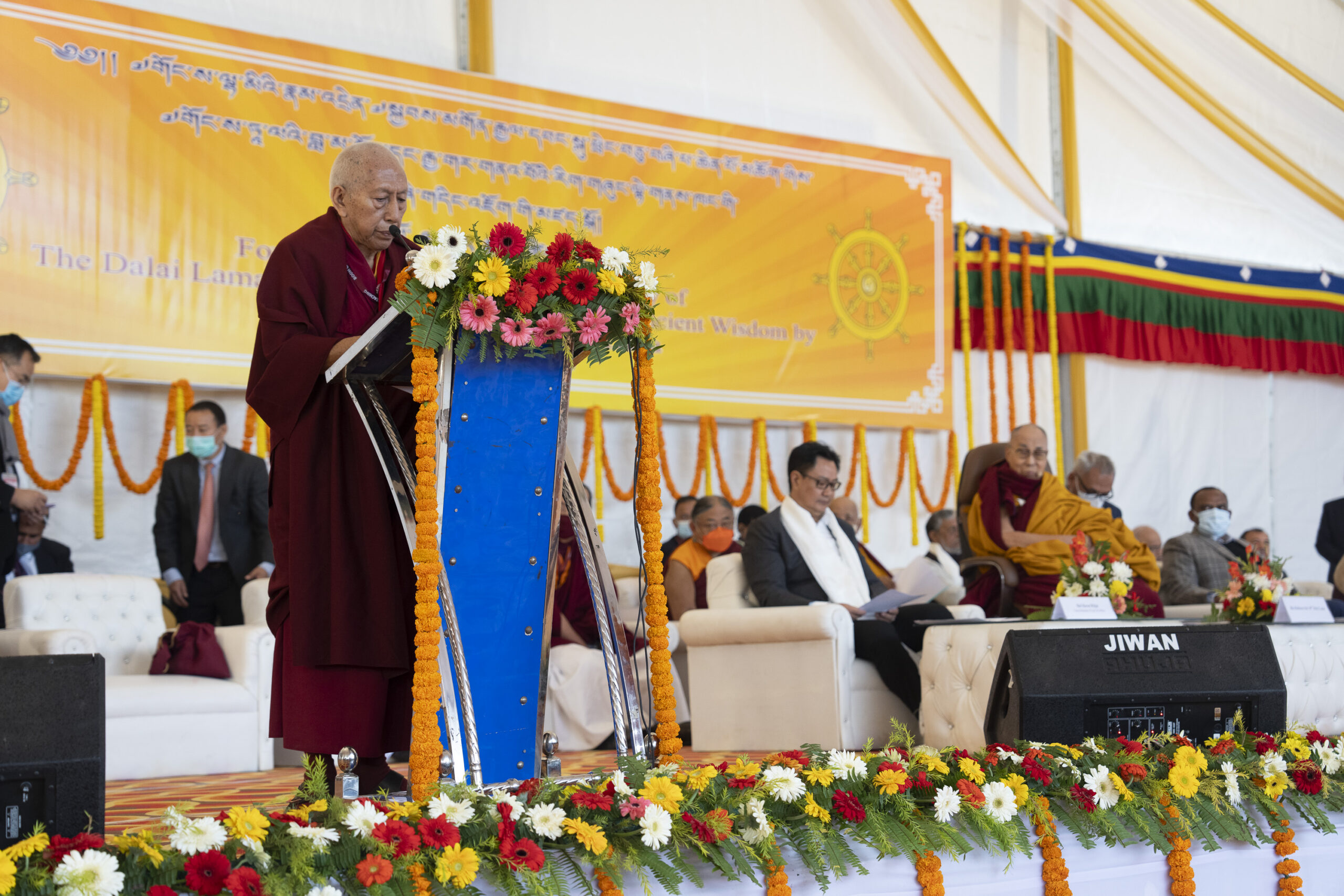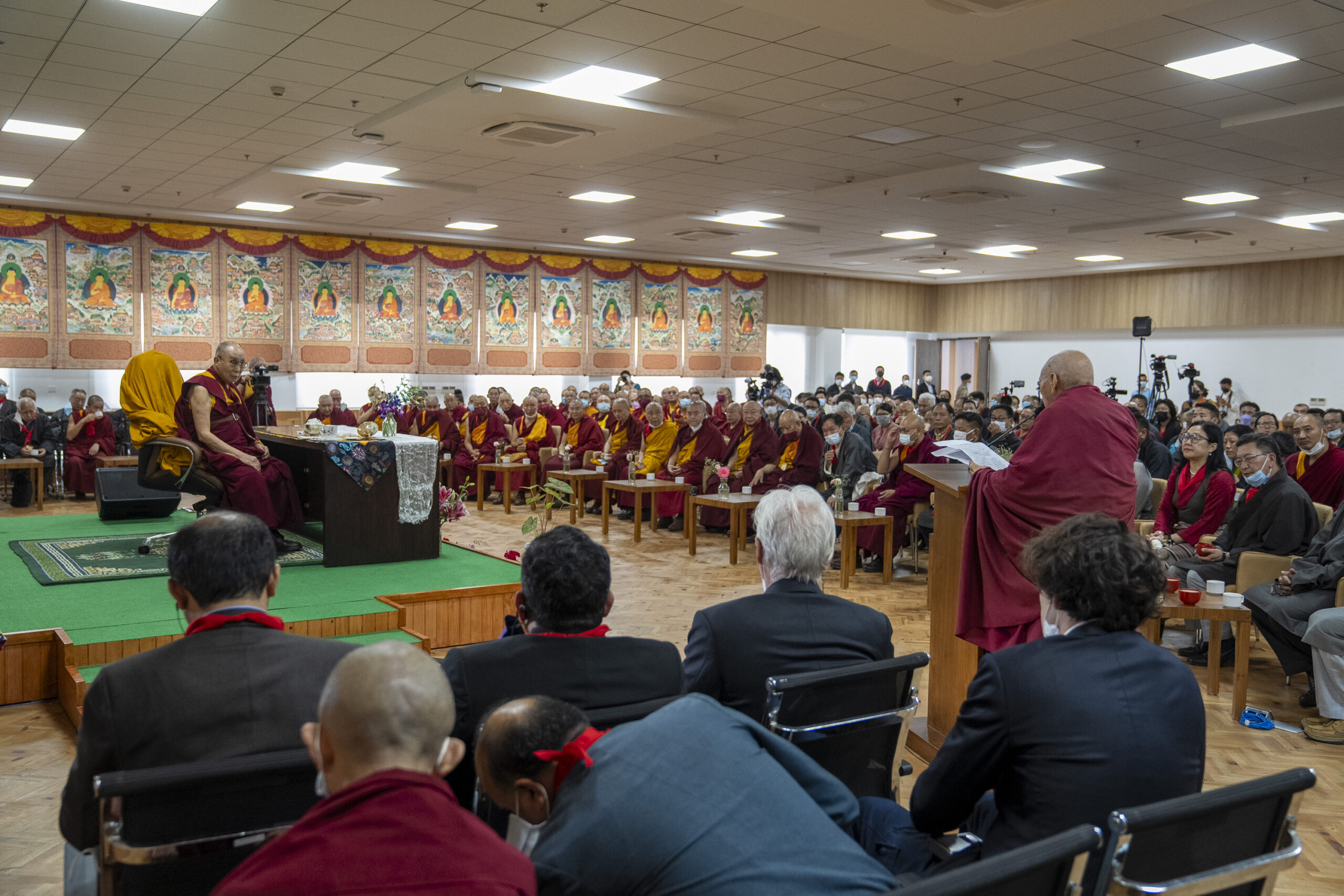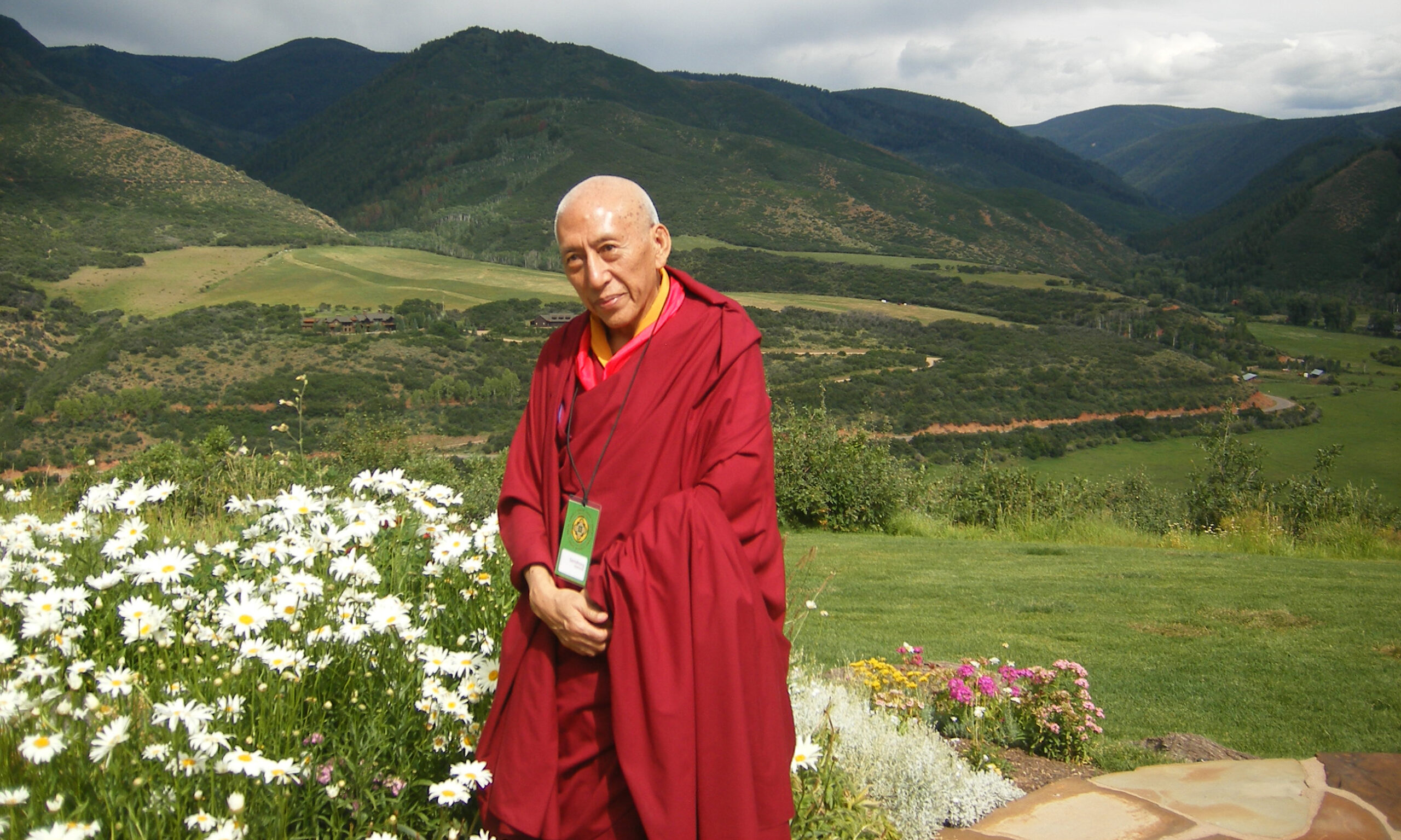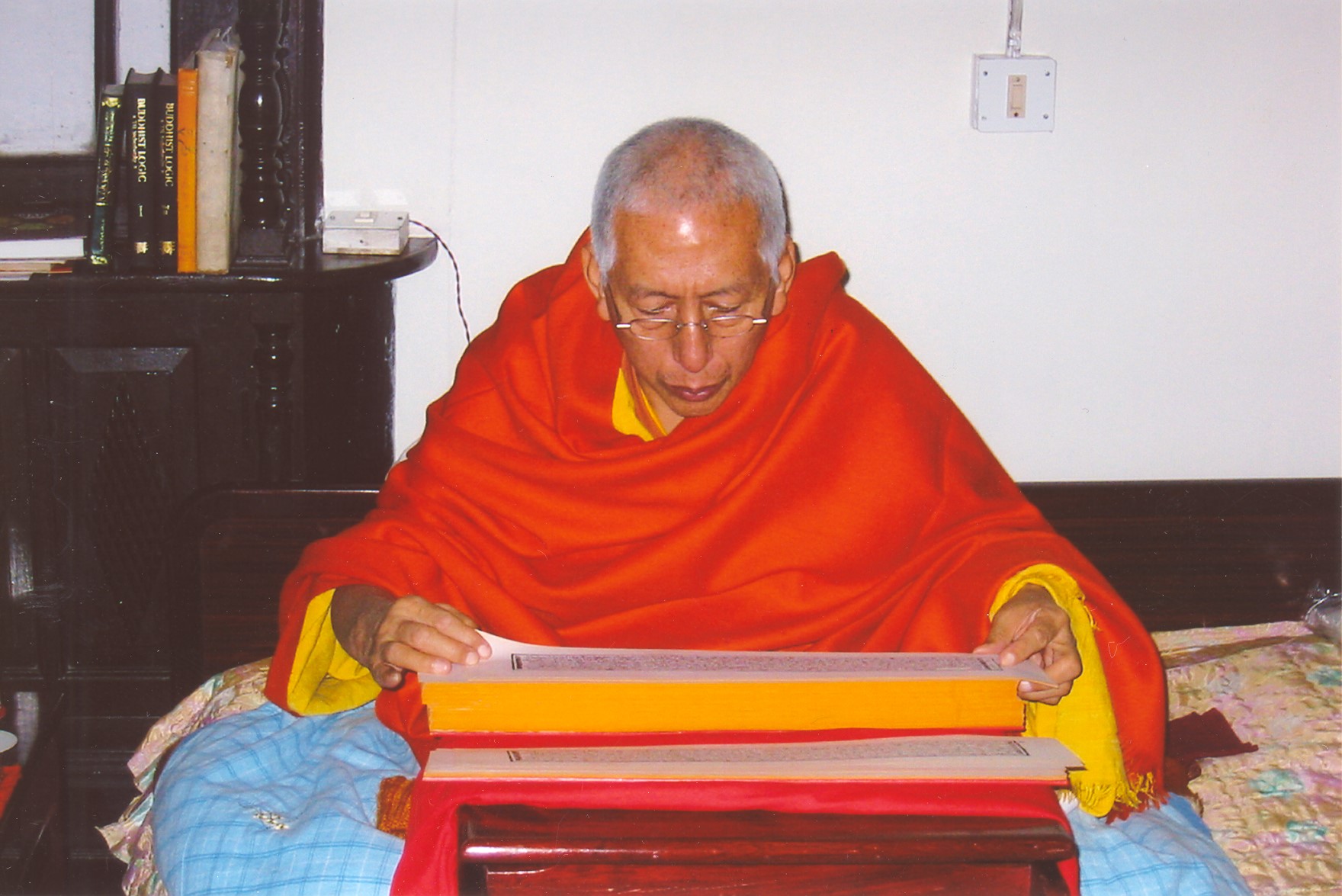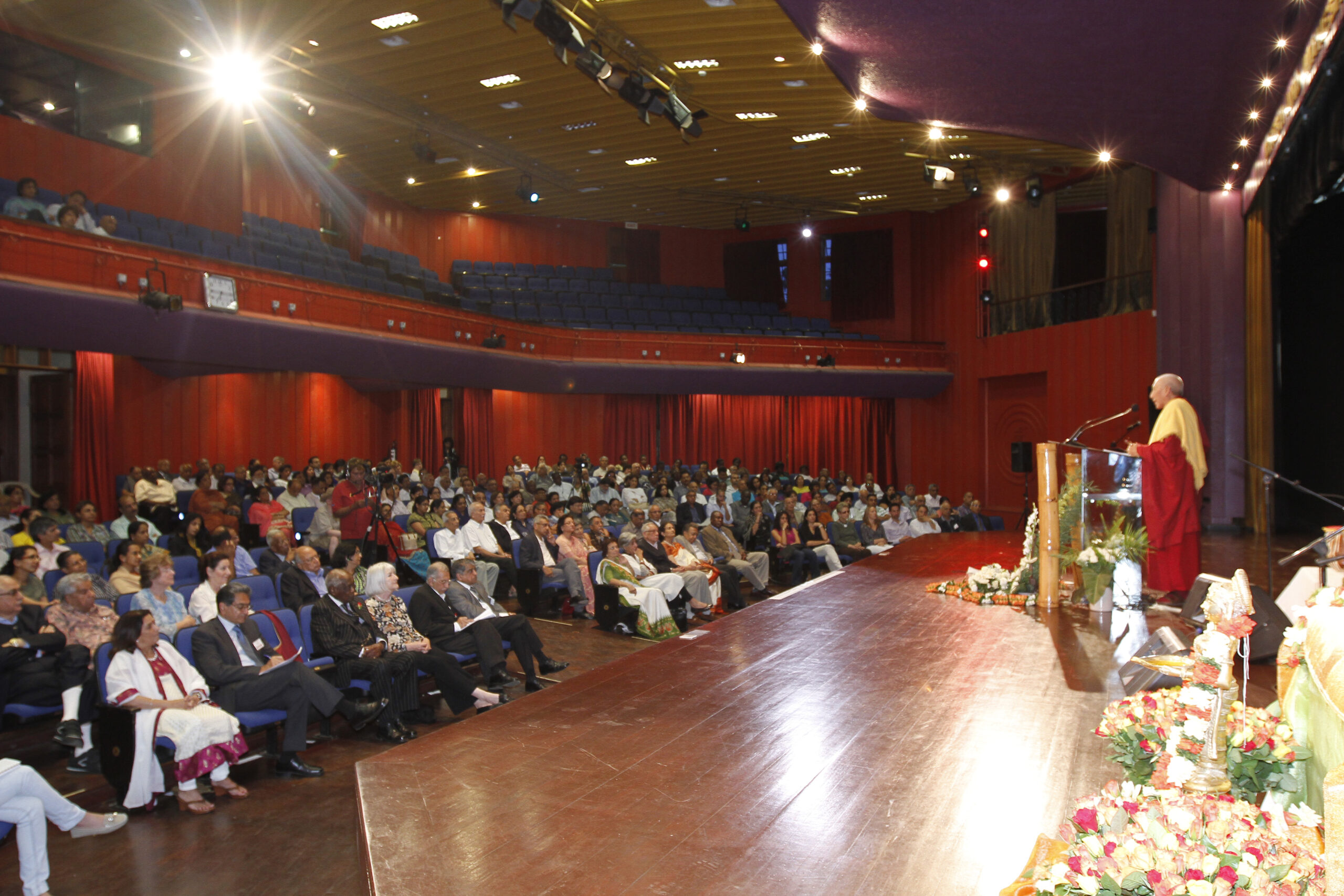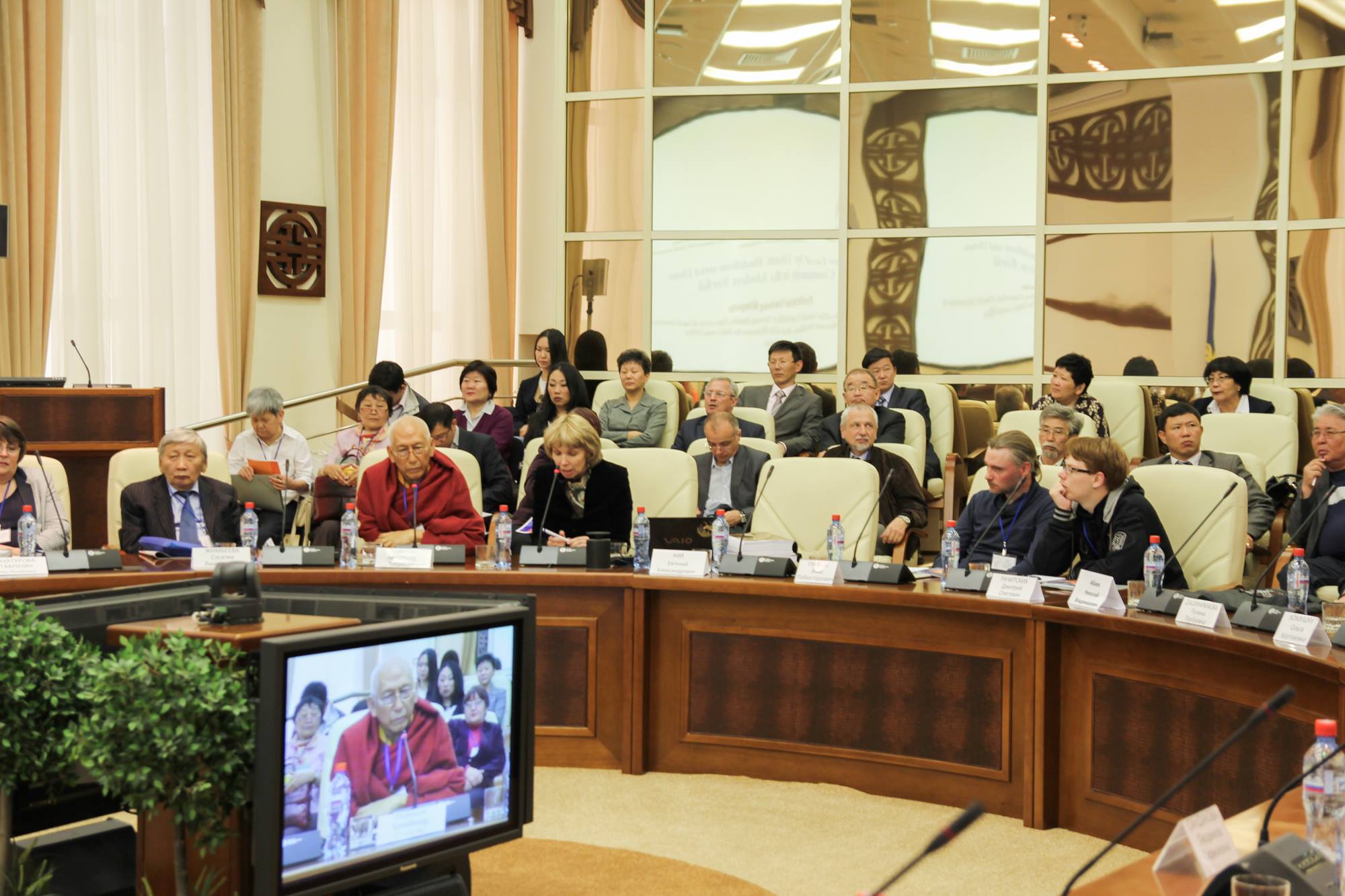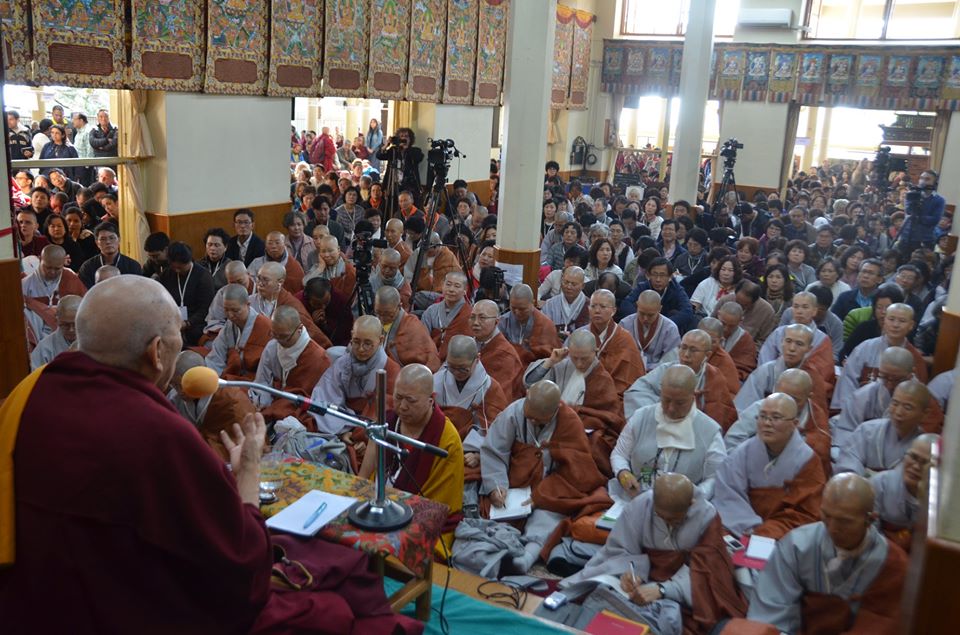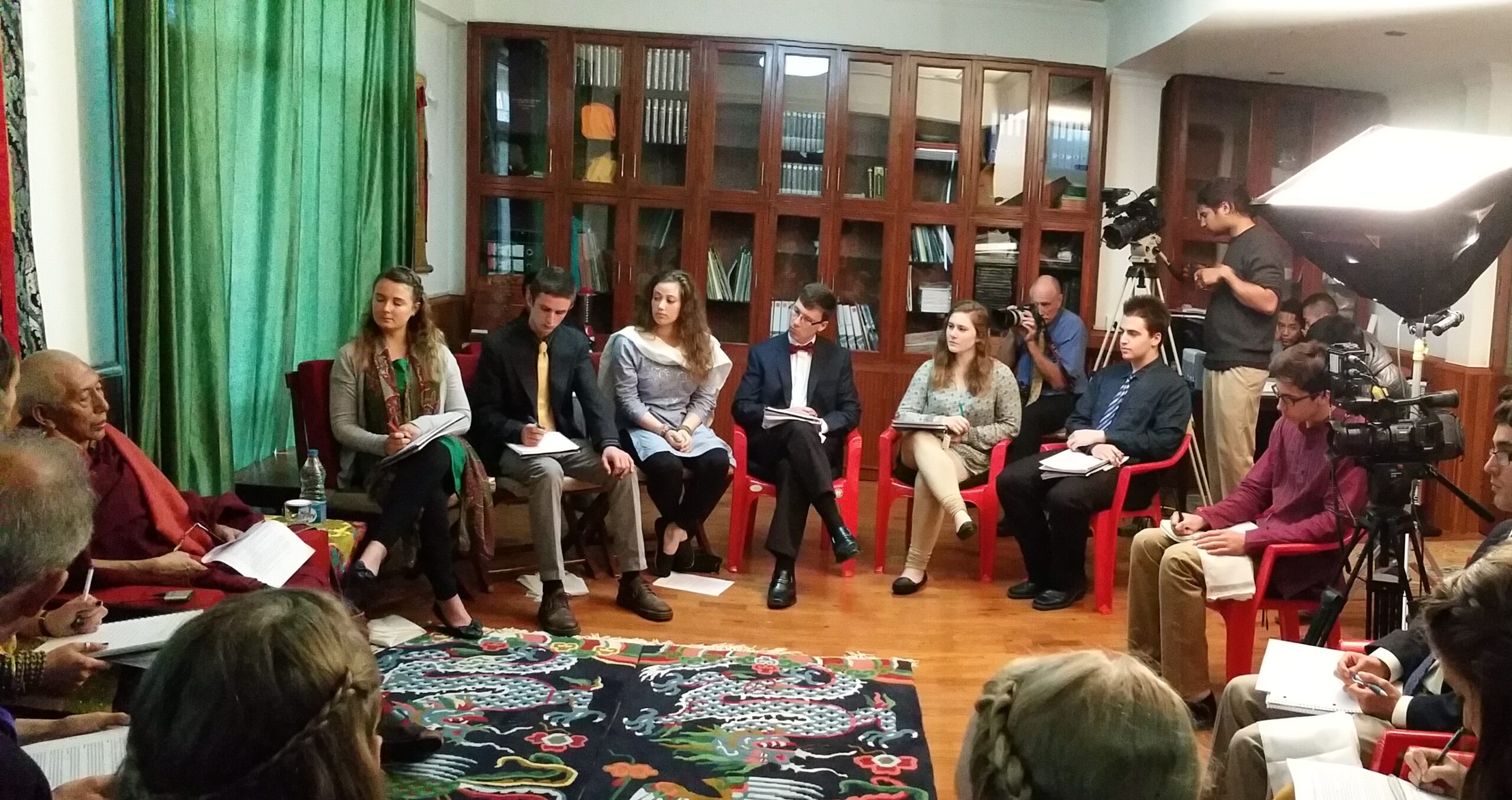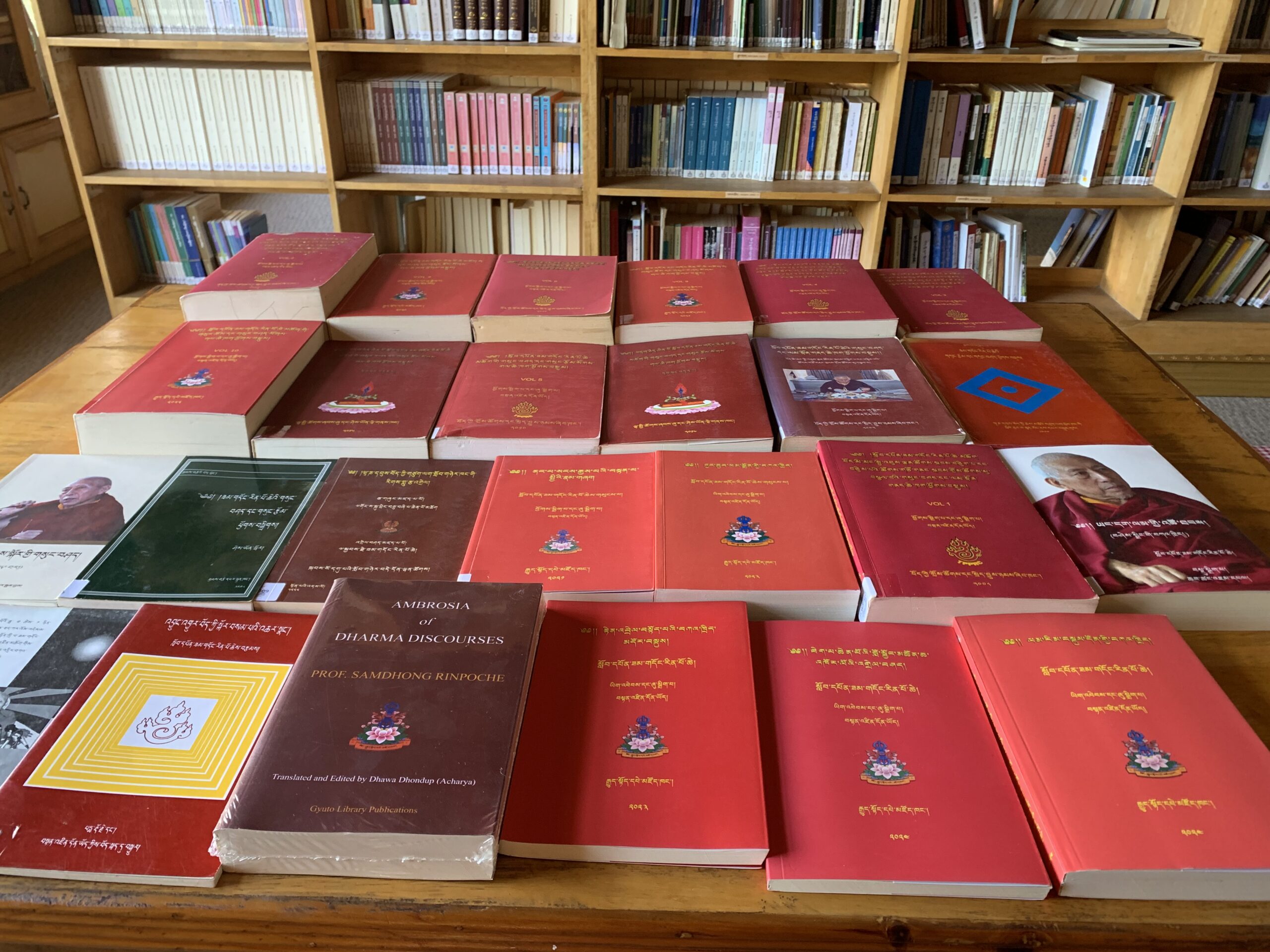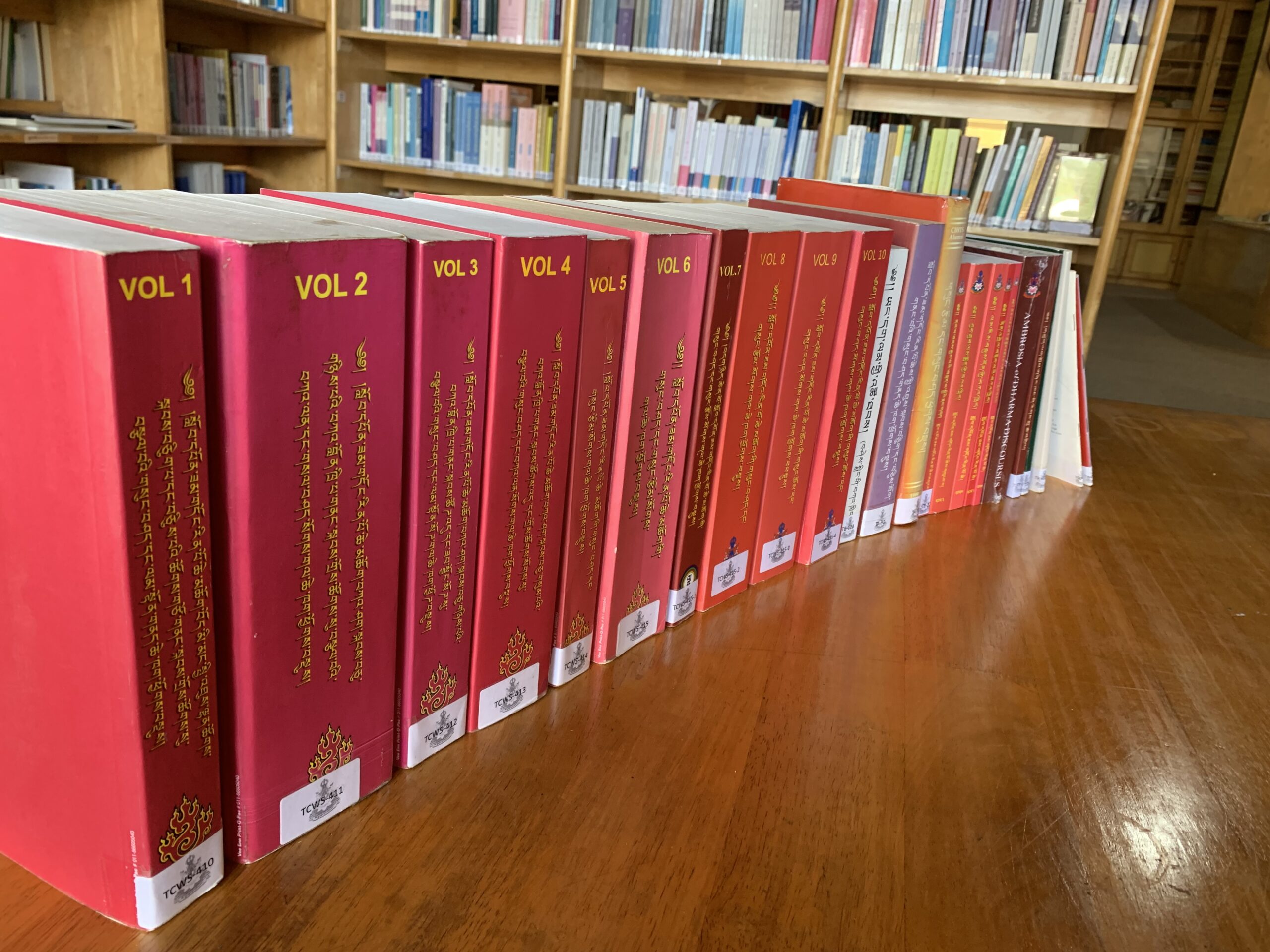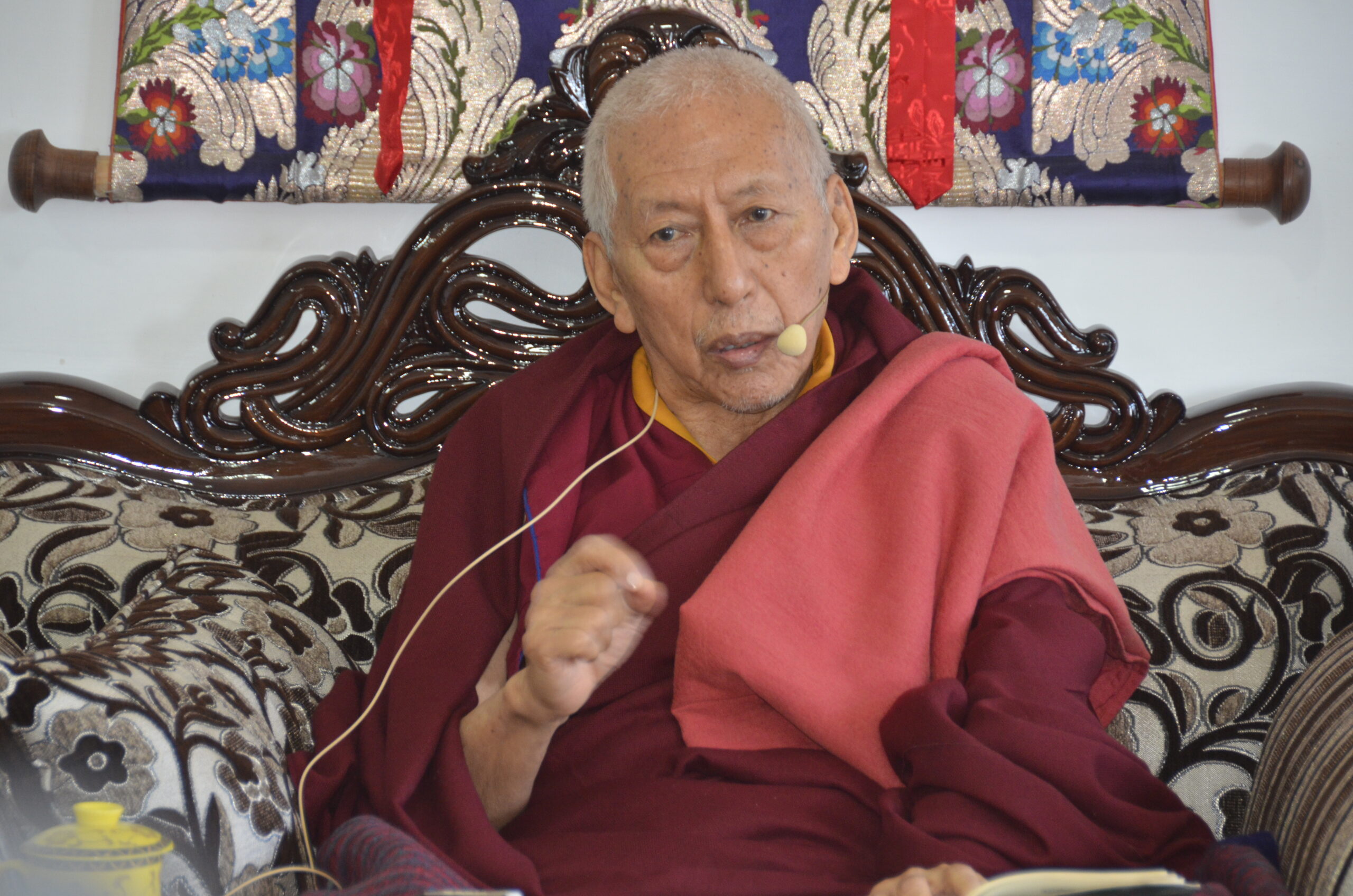The Golden Wheel of Dual System: A Brief Biography of His Eminence Professor Samdhong Rinpoche
Early Life and Reincarnation
His Eminence Professor Samdhong Rinpoche, a beacon of wisdom and compassion, graced this world on November 5, 1939, in the serene region of Jol, Kham Province, Eastern Tibet. A revered figure, luminary in spiritual practice, philosophy, and distinguished scholarship, His Eminence is a paragon of visionary leadership and transformative reform.
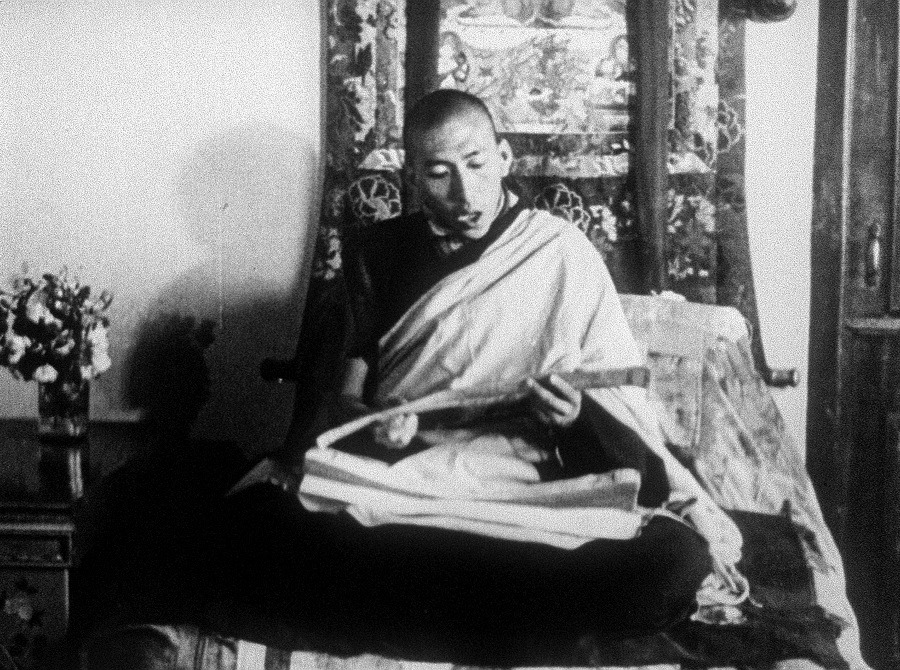 His wisdom and life’s work, deeply rooted in the timeless principles of truth, nonviolence, and boundless compassion, serve as a beacon of hope and inspiration, illuminating the path for countless seekers and admirers worldwide. At the age of five, Rinpoche’s potential was recognized by the most senior Lama in the area, who identified him as the reincarnation of the fourth Samdhong Rinpoche. This early recognition, a testament to his extraordinary spiritual prowess, marked the beginning of his incredible journey, which would shape the course of Tibetan Buddhism and politics. Two years later, Rinpoche took his vows as a monk and embarked on his education, a blend of everyday subjects and spiritual studies led by the esteemed Reverend Ngawang Jinpa.
His wisdom and life’s work, deeply rooted in the timeless principles of truth, nonviolence, and boundless compassion, serve as a beacon of hope and inspiration, illuminating the path for countless seekers and admirers worldwide. At the age of five, Rinpoche’s potential was recognized by the most senior Lama in the area, who identified him as the reincarnation of the fourth Samdhong Rinpoche. This early recognition, a testament to his extraordinary spiritual prowess, marked the beginning of his incredible journey, which would shape the course of Tibetan Buddhism and politics. Two years later, Rinpoche took his vows as a monk and embarked on his education, a blend of everyday subjects and spiritual studies led by the esteemed Reverend Ngawang Jinpa.
Exile and Service Begin
 At twelve, Rinpoche embarked on his monastic education at the prestigious Drepung Monastic University in Lhasa, immersing himself in significant scriptures and numerous commentarial teachings. However, his studies were abruptly interrupted by the Chinese invasion of Tibet in 1959, a tumultuous period that tested his faith and forced Rinpoche to make the difficult decision to flee his homeland alongside His Holiness the 14th Dalai Lama and seek political asylum in India. This is a testament to his unwavering commitment to the spiritual path and the Tibetan cause, a commitment that continues to inspire. At 20, Rinpoche received the full ordination vows (Bhikṣu) at Bodh Gaya in North India. This significant event, where he was ordained by His Holiness the Dalai Lama as the Abbot, is evidence of Rinpoche’s firm devotion to Buddhism.
At twelve, Rinpoche embarked on his monastic education at the prestigious Drepung Monastic University in Lhasa, immersing himself in significant scriptures and numerous commentarial teachings. However, his studies were abruptly interrupted by the Chinese invasion of Tibet in 1959, a tumultuous period that tested his faith and forced Rinpoche to make the difficult decision to flee his homeland alongside His Holiness the 14th Dalai Lama and seek political asylum in India. This is a testament to his unwavering commitment to the spiritual path and the Tibetan cause, a commitment that continues to inspire. At 20, Rinpoche received the full ordination vows (Bhikṣu) at Bodh Gaya in North India. This significant event, where he was ordained by His Holiness the Dalai Lama as the Abbot, is evidence of Rinpoche’s firm devotion to Buddhism.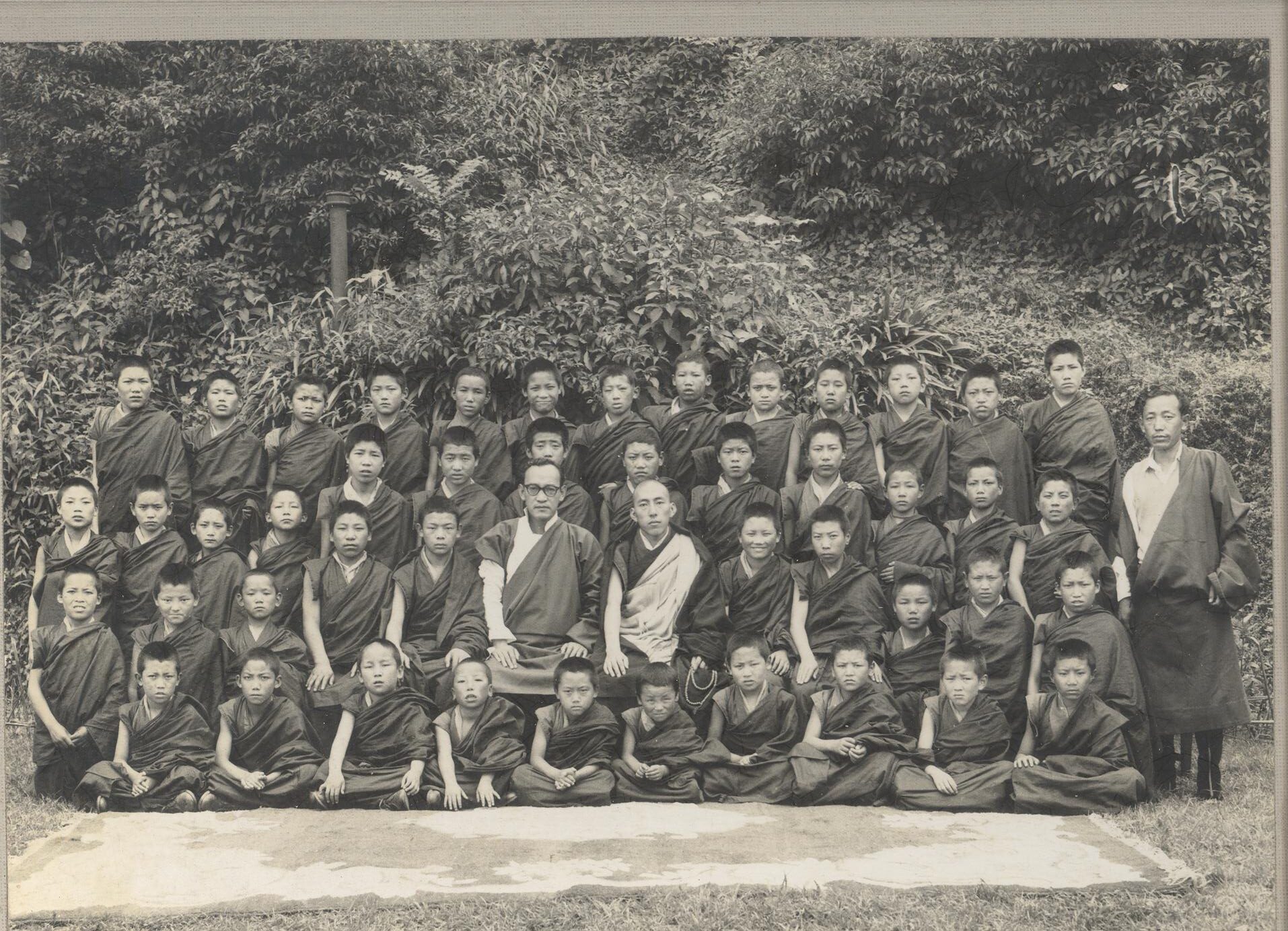
The following year, in 1960, Rinpoche was entrusted by His Holiness the Dalai Lama to serve the Tibetan Administration in exile in Dharamshala. He taught many monks advanced Tibetan language and literature, nurturing numerous renowned students. It was the initial step in preserving, maintaining, and promoting the Tibetan language, religion, and culture. This period marked a pivotal moment in his life as he continued receiving profound teachings from his two Eminent tutors, but also began to shape the Tibetan community’s future in exile. Rinpoche’s leadership and dedication were instrumental in the community’s resilience and growth.
Academic Achievements and Education Contributions
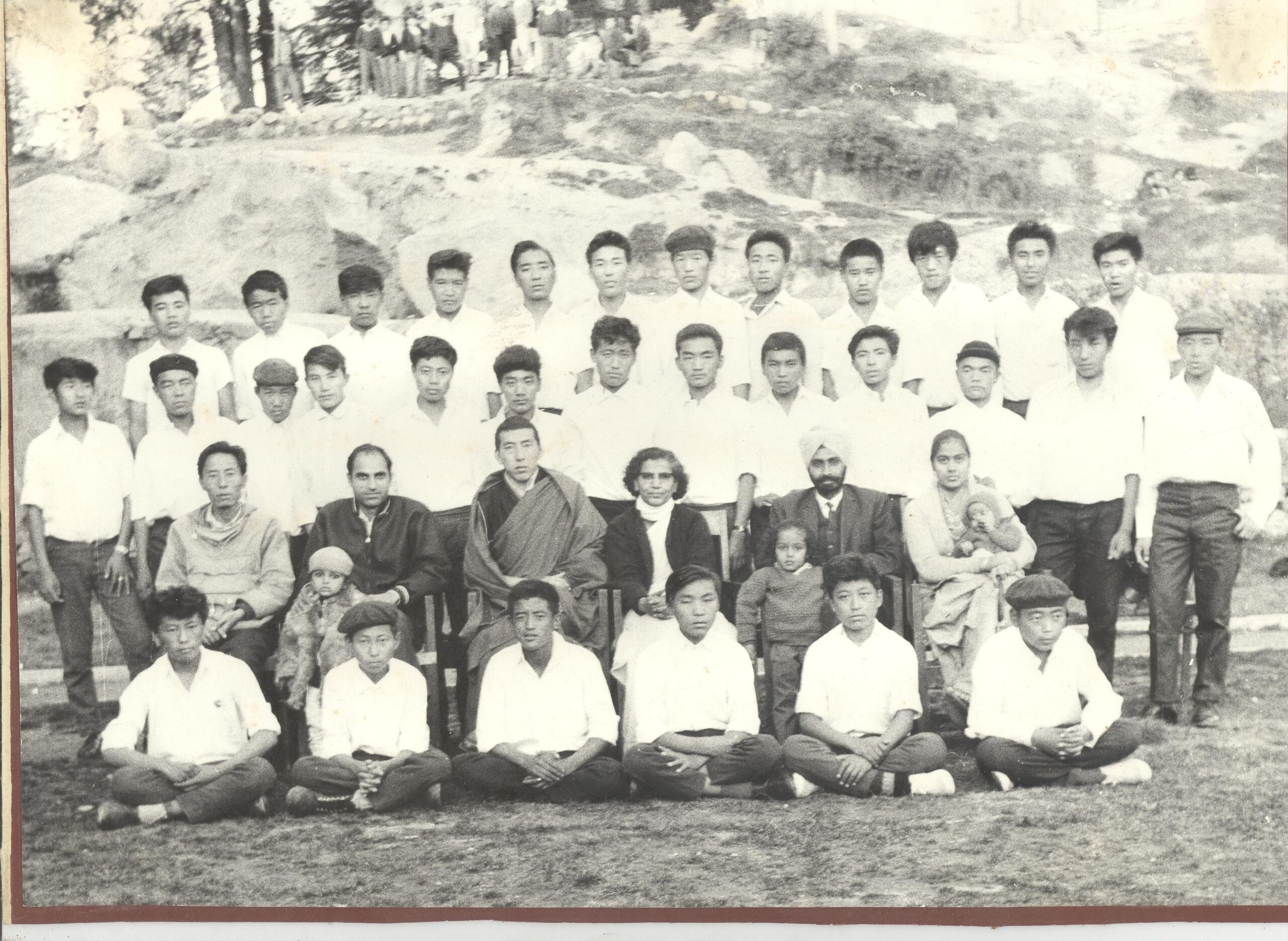 Rinpoche’s intellectual prowess was recognized when he was awarded the “Geshe Lharampa” Degree equivalent to a Doctorate from the re-established Drepung Monastery in India in 1968 and the “Geshe Ngag-rampa” (Tantric Adept) Degree from the re-established Gyuto Tantric Monastery, Dalhousie, HP, India in 1970. These academic achievements and leadership roles underscore his significant contributions to the Tibetan community in exile.
Rinpoche’s intellectual prowess was recognized when he was awarded the “Geshe Lharampa” Degree equivalent to a Doctorate from the re-established Drepung Monastery in India in 1968 and the “Geshe Ngag-rampa” (Tantric Adept) Degree from the re-established Gyuto Tantric Monastery, Dalhousie, HP, India in 1970. These academic achievements and leadership roles underscore his significant contributions to the Tibetan community in exile.
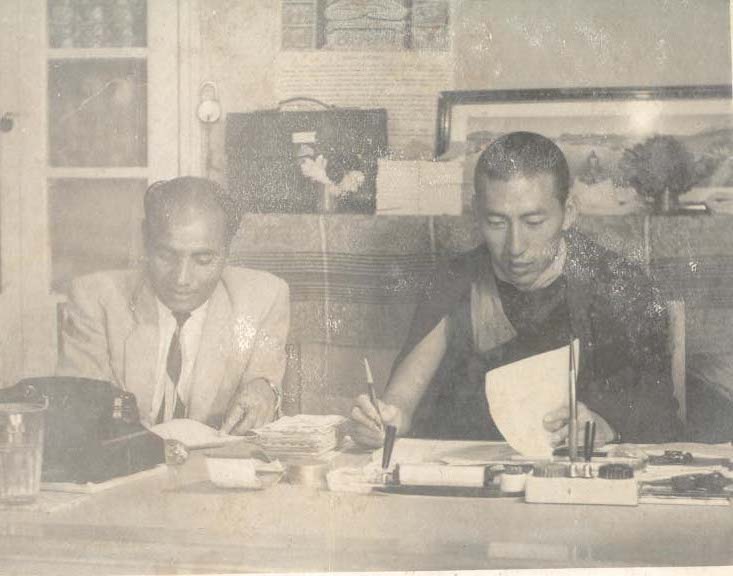 Throughout Rinpoche’s higher studies in Buddhist philosophy, which commenced in 1961, he remained steadfast in his commitment to the Tibetan community in exile. His dedication was particularly significant in the field of education, where he served as a religious teacher at the Central School for Tibetans in Shimla and Darjeeling at the age of 22. His passion for teaching and his leadership qualities were further recognized when, at the age of 26 in 1965, he was appointed as the Principal of the Central School for Tibetans Dalhousie, a position he held with distinction. During that time Rinpoche contributed towards the development of education and the welfare of the students. At that time, for a period, he assumed the role of Honorary Secretary in the Department of Religious, Central Tibetan Administration (CTA).
Throughout Rinpoche’s higher studies in Buddhist philosophy, which commenced in 1961, he remained steadfast in his commitment to the Tibetan community in exile. His dedication was particularly significant in the field of education, where he served as a religious teacher at the Central School for Tibetans in Shimla and Darjeeling at the age of 22. His passion for teaching and his leadership qualities were further recognized when, at the age of 26 in 1965, he was appointed as the Principal of the Central School for Tibetans Dalhousie, a position he held with distinction. During that time Rinpoche contributed towards the development of education and the welfare of the students. At that time, for a period, he assumed the role of Honorary Secretary in the Department of Religious, Central Tibetan Administration (CTA).
Academic Leadership and Contributions
 From 1971 to 1977, Rinpoche served as the Principal of the Central Institute of Higher Tibetan Studies in Sarnath, Varanasi. Following this, from 1977 to 1988, he held the position of Principal and Director of the Central Institute of Higher Tibetan Studies (CIHTS), Varanasi, an autonomous organization under the Ministry of Human Resource Development and Department of Culture, Govt. of India. Later, this institute transformed into Deemed University, where he held the position of Director from 1988 to 2001.
From 1971 to 1977, Rinpoche served as the Principal of the Central Institute of Higher Tibetan Studies in Sarnath, Varanasi. Following this, from 1977 to 1988, he held the position of Principal and Director of the Central Institute of Higher Tibetan Studies (CIHTS), Varanasi, an autonomous organization under the Ministry of Human Resource Development and Department of Culture, Govt. of India. Later, this institute transformed into Deemed University, where he held the position of Director from 1988 to 2001.
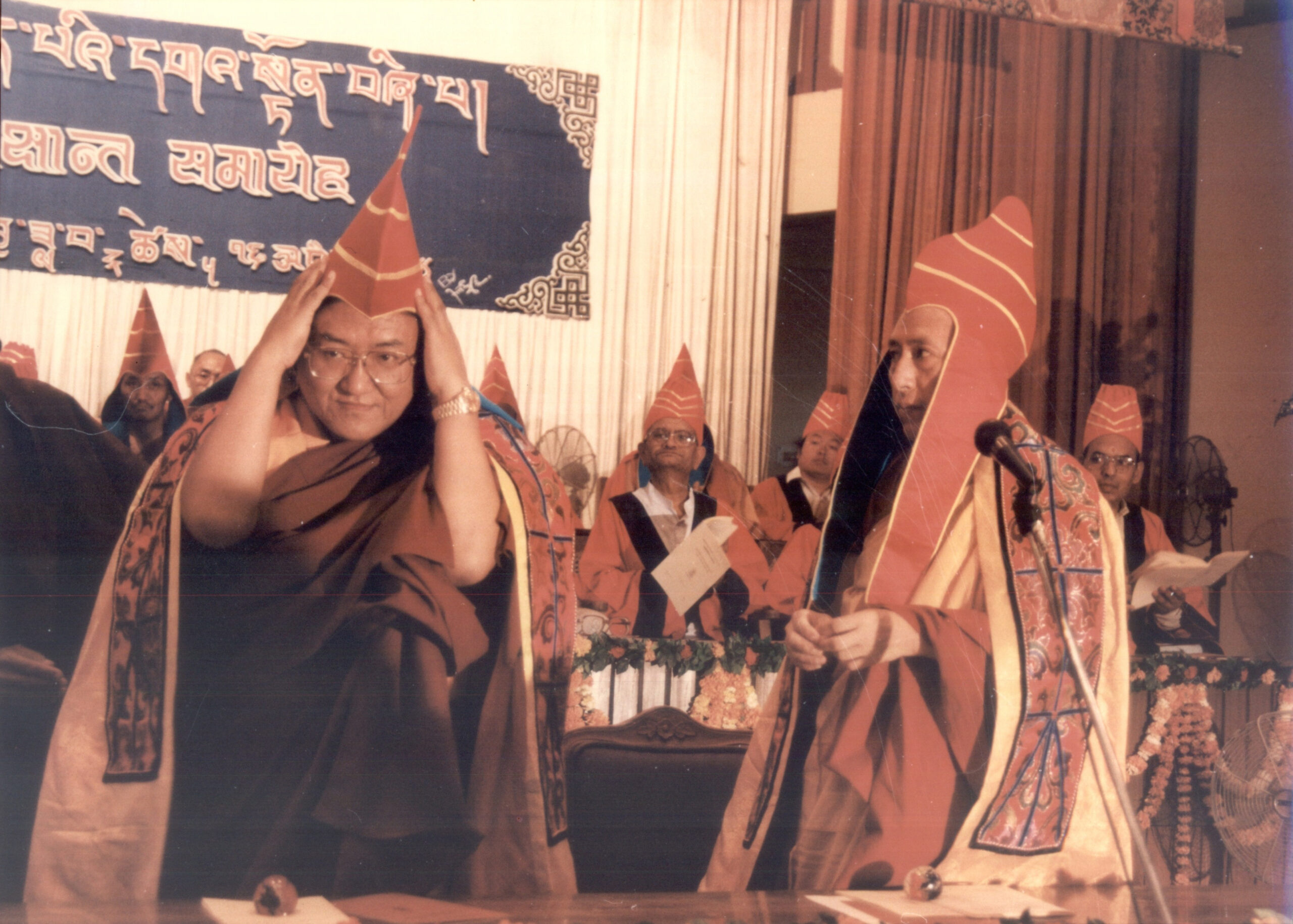 Rinpoche’s tireless efforts, commitment, courage, wisdom and dedication were instrumental in building the institute from ground up, overseeing everything from the construction of its foundation to the development of its attractive traditional Tibetan architecture. He meticulously crafted and implemented academic subjects, courses, and syllabi for higher Buddhist studies, encompassing the teachings of the four primary Tibetan Buddhist schools and the ancient Tibetan religion Bön. Each subject was designed to be equivalent to modern university education. This university is the first and only internationally recognized institute of higher Tibetan studies in Tibetan history. It offers a comprehensive study where the four primary schools of Tibetan Buddhism and Bön can study their respective doctrines and unique philosophies under a single organizational structure.
Rinpoche’s tireless efforts, commitment, courage, wisdom and dedication were instrumental in building the institute from ground up, overseeing everything from the construction of its foundation to the development of its attractive traditional Tibetan architecture. He meticulously crafted and implemented academic subjects, courses, and syllabi for higher Buddhist studies, encompassing the teachings of the four primary Tibetan Buddhist schools and the ancient Tibetan religion Bön. Each subject was designed to be equivalent to modern university education. This university is the first and only internationally recognized institute of higher Tibetan studies in Tibetan history. It offers a comprehensive study where the four primary schools of Tibetan Buddhism and Bön can study their respective doctrines and unique philosophies under a single organizational structure.
Today, the Central Institute of Higher Tibetan Studies (CIHTS) is considered a premier Tibetan-based higher education institution, combining traditional learning with modern academic standards and a “center of research on Tibetology, restoration of historical texts, Tibetan Medicine, Buddhist Philosophy, History, Tibetan Language and Literature, Tibetan Arts and Crafts, Political Science, Economics, Pali, Sanskrit, English, Hindi and imparting knowledge of Buddhism in Tibet.” It is under the guidance of His Holiness the Dalai Lama that Rinpoche lead this pioneering project. And it is their constant efforts and clear vision that ensured the mission of this institution to be implemented.
While at the Central Institute of Higher Tibetan Studies, Rinpoche initiated and took responsibility for many educational and social development projects. Among these, from 1970 to 1973, he served as the Vice President of the Tibetan Youth Congress, and he gave comprehensive advice and direct support during the launch of the initial program of the Tibetan Freedom Movement at CIHTS in Varanasi in 1972. This program is now one of the most critical funding sources for the Central Tibet Administration.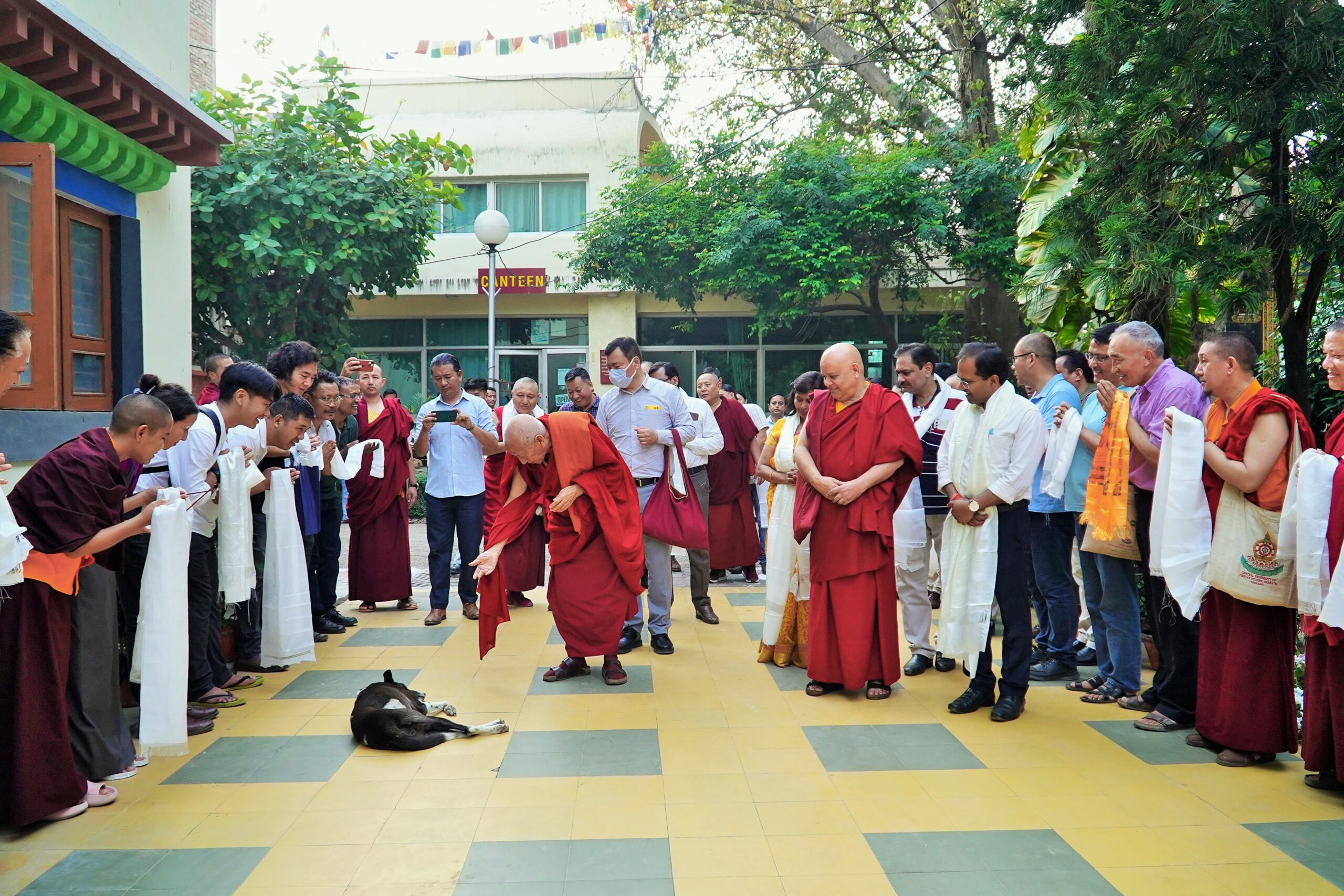
Political Leadership and Contributions
Professor Samdhong Rinpoche is one of the most remarkable Tibetan leaders of our time. With great vision, determination, courage, intellect and commitment, Rinpoche undertook exemplary innovations and reforms. During his tenure as Kalon Tripa from 2001 to 2011, and previously as Speaker of the Tibetan Parliament in Exile from 1991 to 2001, he introduced many exemplary initiatives, improvements, and reforms that brought significant benefits in the short, medium, and long term.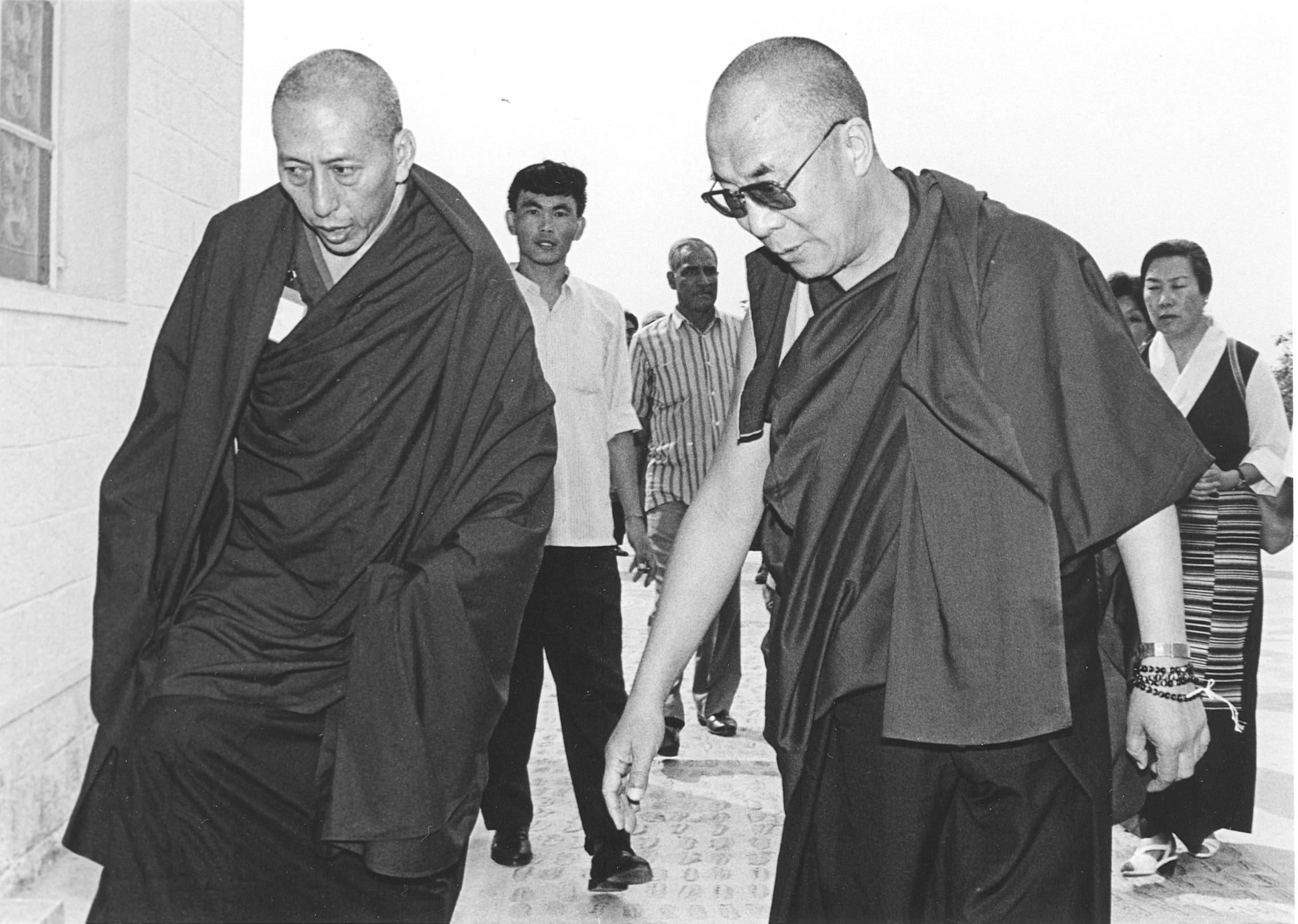
He skilfully maintained a balance of power among the three pillars of democracy, ensuring that none overstepped their boundaries. Moreover, he successfully transformed the Tibetan administration into a system governed by the “rule of law” rather than the “rule of a person.” In essence, these actions enabled Tibetan democracy to reach a high and genuine level of progress in a relatively short period of time.
In 1990, in an effort to advance the process of democratization of Tibetan society and administration, His Holiness the Dalai Lama appointed Rinpoche as a member of the Constitution Drafting Committee. This committee formulated a draft of the Charter of Tibetans-in-Exile as well as Guidelines for Future Tibet’s Politics and Basic Features of Its Constitution. Rinpoche led the exile administration towards genuine democracy, like the process of nurturing a child from infancy to their self-standing adulthood. In 1991, His Holiness nominated Rinpoche as a member of the Tibetan Parliament in Exile, previously called,
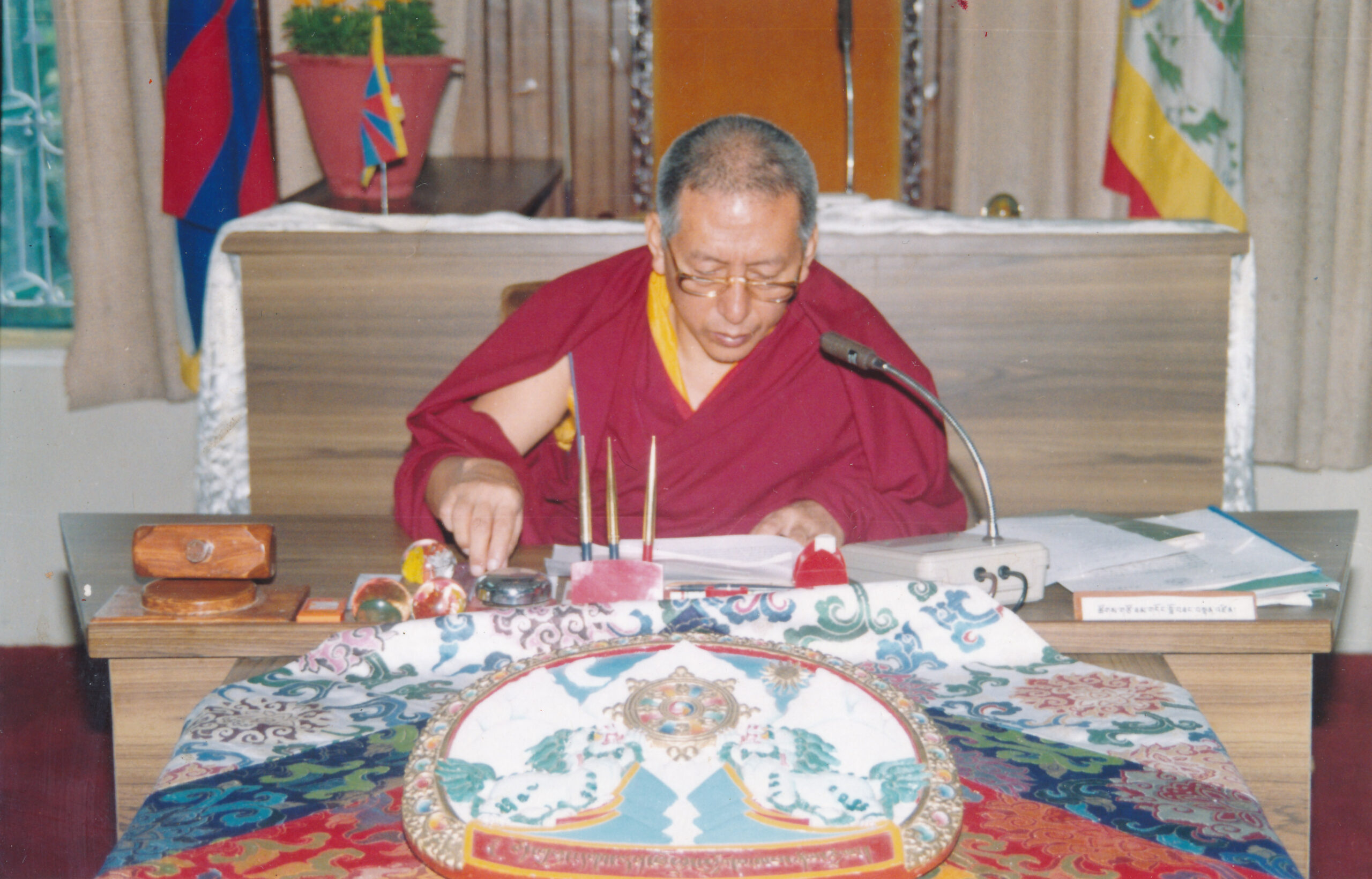 Assembly of the Tibetan People’s Deputies. In 1996, Rinpoche was elected as one of the representatives of the Dhotoe region. Between 1991 and 2001, Rinpoche was consecutively elected twice as Speaker of the Tibetan Parliament. During Rinpoche’s ten years in Parliament, Rinpoche introduced a high standard of legislative procedures, laying a solid foundation for Tibetan democracy. He also guided Parliament through the procedures of a democratic system in a way akin to a teacher leading a student by explaining each article in an elaborative way. He often worked single-handedly and did the more significant part of drafting the rules and policies necessary for the exile parliamentary system. Committed to the rule of law, Rinpoche also introduced a sound and effective method for Parliament to oversee the executive wing of the administration. Our parliament’s ability to use sophisticated parliamentary procedures and legislative bodies like those of advanced countries is solely due to Rinpoche’s efforts.
Assembly of the Tibetan People’s Deputies. In 1996, Rinpoche was elected as one of the representatives of the Dhotoe region. Between 1991 and 2001, Rinpoche was consecutively elected twice as Speaker of the Tibetan Parliament. During Rinpoche’s ten years in Parliament, Rinpoche introduced a high standard of legislative procedures, laying a solid foundation for Tibetan democracy. He also guided Parliament through the procedures of a democratic system in a way akin to a teacher leading a student by explaining each article in an elaborative way. He often worked single-handedly and did the more significant part of drafting the rules and policies necessary for the exile parliamentary system. Committed to the rule of law, Rinpoche also introduced a sound and effective method for Parliament to oversee the executive wing of the administration. Our parliament’s ability to use sophisticated parliamentary procedures and legislative bodies like those of advanced countries is solely due to Rinpoche’s efforts.
Political Leadership
His Holiness the Dalai Lama introduced a system for the people to directly elect their leader. In 2001, at the request of the Tibetan people from both inside Tibet and in exile, Rinpoche was elected as the first-ever Tibetan leader under this system, with an overwhelming majority.
In 2005, he was re-elected for a second term. During his tenure as Kalon Tripa, Rinpoche implemented significant administrative changes and progress. He established Truth, Nonviolence, and Genuine Democracy as the three seals of standards for all works of the Kashag (Cabinet). Rinpoche ensured an equal division of powers and a balance among the three pillars—Legislative, Judicial, and Executive. He also adhered to a strict non-interference policy in the offices of autonomous organizations.
During Rinpoche’s leadership at the Central Tibet Administration, various amended rules, regulations, and policies were introduced and implemented, including the Basic Tibetan Education Policy. This policy, the first of its kind in Tibet’s history, aimed to preserve and promote the Tibetan language, cultural heritage and identity, ensuring that future generations would receive holistic education, both traditional and modern, fostering intelligence and wholesome virtues. The policy’s impact has been significant, with an overwhelming number of students from every corner of the Tibetan community expressing interest in the new school when the Central Tibetan Administration opened it. However, the school can only accommodate a portion of the admissions due to capacity limitations. Rinpoche also initiated numerous professional scholarships for Tibetans to pursue higher education in Indian universities and overseas, resulting in the highest number of scholarship recipients to date.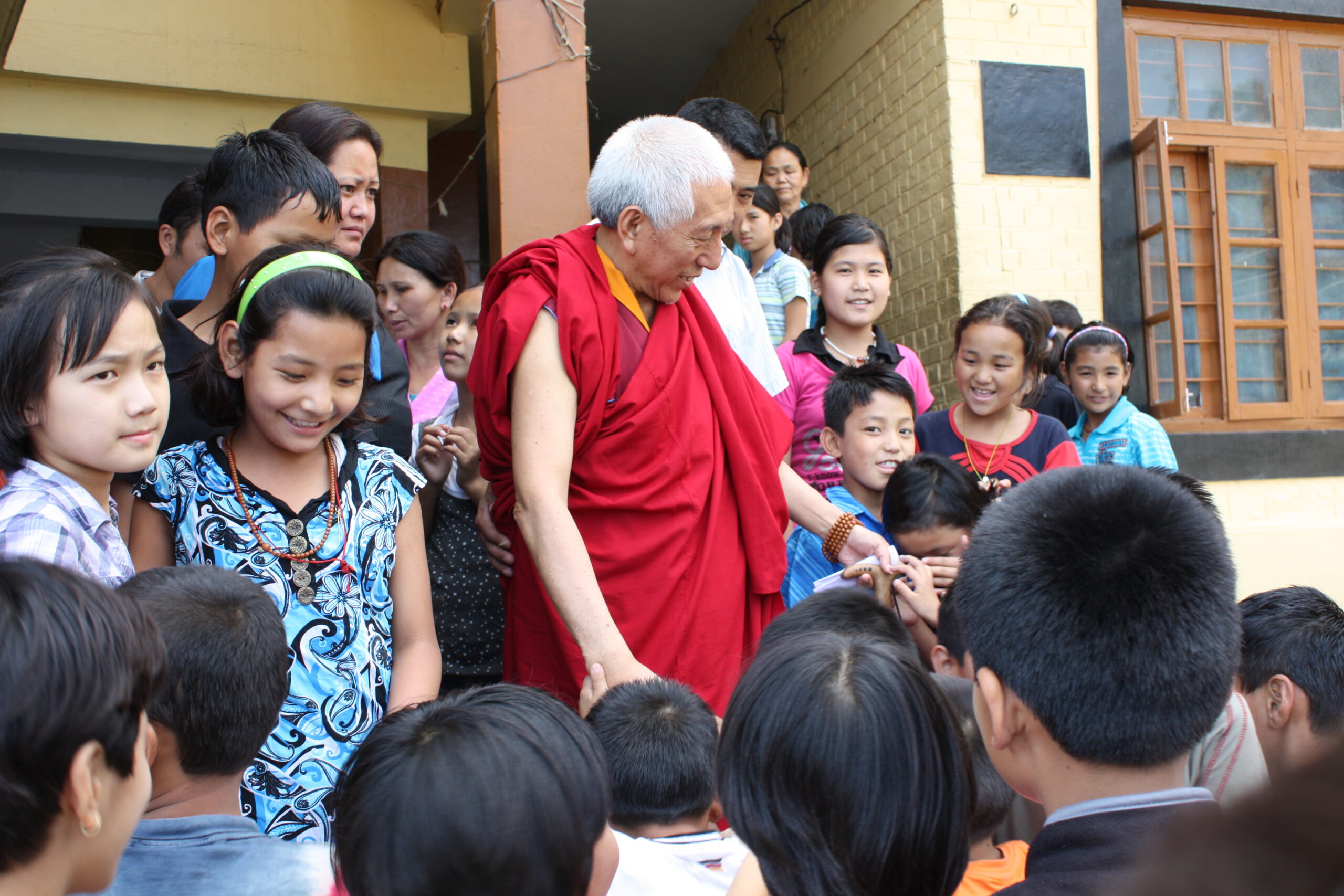
In addition to Rinpoche’s political achievements, he also significantly contributed to the institution’s stability, social welfare, education, and other areas. He introduced and adopted different policies, rules, and regulations such as the Tibetan Medicine Central Council Act, the Tibetan Religion Council Act, and the Tibetan Chamber of Commerce Act. along with policies like the healthcare policy, a welfare policy for the disadvantaged people, a women’s empowerment policy, an organic farming policy. In addition, Rinpoche improved the budget planning and submission system, strengthened the financial management, and enhanced over all stability in the admirative system. Under Rinpoche’s leadership, the Exile administration became financially stable and became established as a sustainable and prosperous organization for the long term. He also implemented policies for developing Tibetan cooperative societies for their self-reliance and sustainable economy. This policy enabled a solid foundation of Tibetan Settlements, significantly contributing to preserving and promoting Tibetan culture and identity. His initiative to legalize the ownership of land and properties under the Central Tibetan Administration was extremely effective and fruitful.
As the future for Tibetans is uncertain, Rinpoche made a policy that the Tibetan Administration-in-Exile and the working procedures of the various exile-registered associations are all recognized under the law of their host country. This ensures that if a situation arose where the Central Tibetan Administration could not continue, many of the exiled Tibetan organizations would remain legal, self-, and able to function independently.
His Eminence was the first elected leader after His Holiness the Dalai Lama retired from political duties. This played a crucial role in the historic transition process when His Holiness fully retired from his political responsibilities from the Central Tibetan Administration (CTA) in March 2011. Rinpoche’s involvement was vital in ensuring a smooth transition during this significant change in Tibetan leadership. This monumental decision marked a significant shift in the Tibetan leadership structure. He worked closely with His Holiness, the CTA, parliament, and various stakeholders to facilitate this process successfully.
Seek Support and Advocacy for Genuine Tibetan Autonomy
The most significant contribution during Rinpoche’s time as Kalon Tripa was his work to restore the Tibet-China Dialogue based on the Middle Way Policy. Rinpoche worked tirelessly to strengthen and promote the Middle Way Policy and engaged in direct dialogue with the People’s Republic of China (PRC). He confidently proposed to advance the implementation of this policy by adhering to a single agenda and channel, maintaining consistent communication, and seeking mutually beneficial agreements through openness and dialogue. Ten dialogues on separate occasions were held in an effort to seek genuine Tibetan autonomy with the PRC. The clear legal and historical facts about Tibet’s position were presented through the “Memorandum on Genuine Autonomy for the Tibetan People”, another reputable document. During his leadership, and with overwhelming support from the United States government and the European Parliament, Rinpoche extensively travelled overseas to garner support and raise awareness of the Middle Way Policy. Many countries have passed resolutions supporting Tibet issues, such as the US Tibetan Policy Act 2002, and have provided increment in the funding for the Central Tibetan Administration CTA. Rinpoche organized many International Conferences for Tibet Support Groups, which took place in numerous countries and had a record number of participation.
During Rinpoche’s term as Kalon Tripa, he worked continuously to make the Central Tibetan Administration a robust, stable, effective, and transparent institution. Rinpoche has contributed significantly and inclusively towards enhancing Tibetan unity by not holding any bias towards any constituent province or sect but by genuinely paying equal respect to all.
Teachings and Spiritual Activities
Since 2014, with direct guidance from His Holiness the Dalai Lama, and as the requested by monasteries, institutions, Buddhist teachers, and practitioners, His Eminence Professor Samdhong Rinpoche has been teaching textual commentaries, essential empowerments, oral transmissions, guidance discourses, and talks at numerous major Tibetan and Himalayan Buddhist monasteries and educational institutes. Thousands of students and followers, including senior Lamas, former and current abbots, masters, and teachers, are incredibly inspired and enlightened by Rinpoche’s unique way of teaching and detailed explanations. Rinpoche is genuinely admired and continues to inspire thousands of devotees.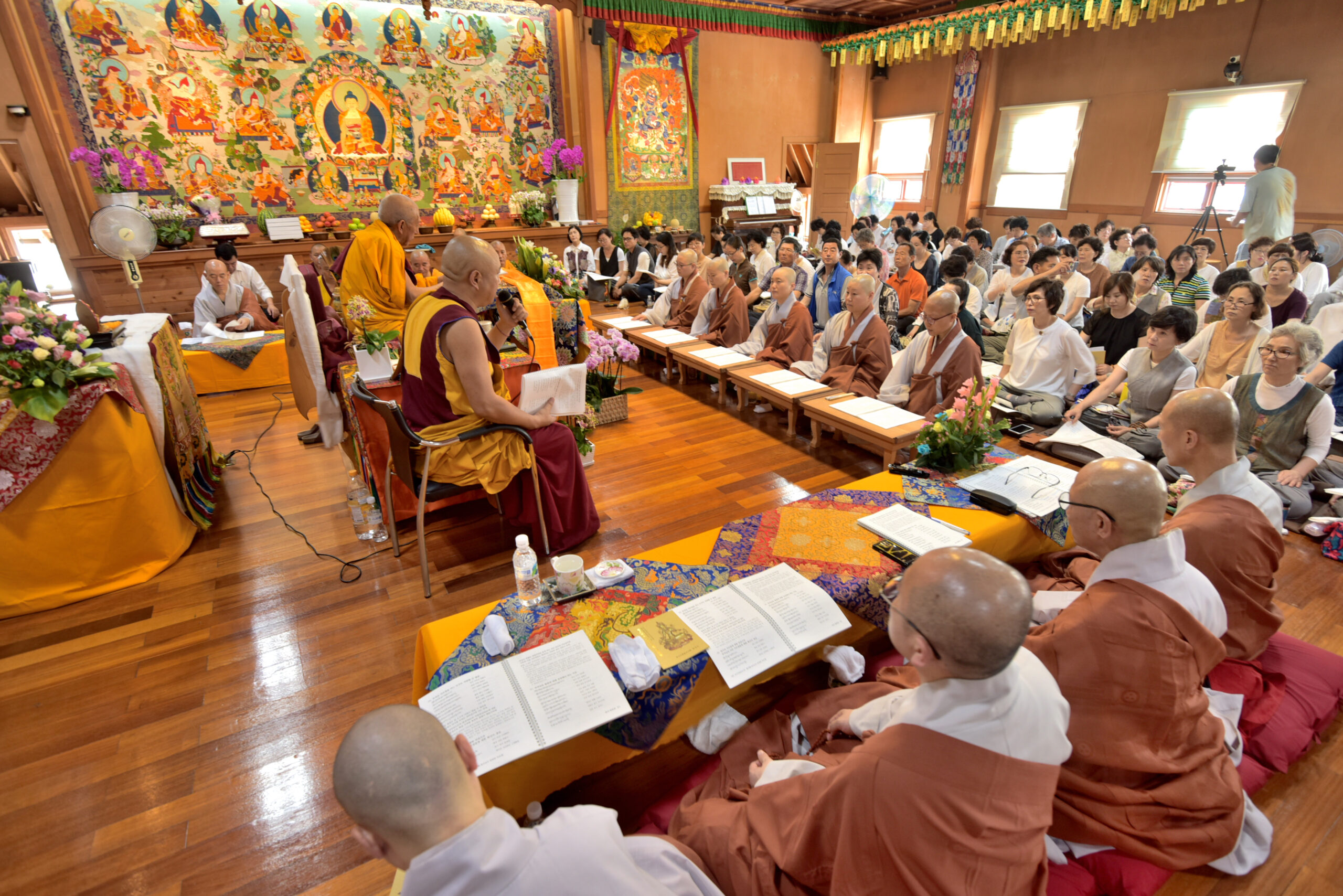
Rinpoche embodies the description of a profound scholar with his intelligence and multi-language capacity, subtle reasoning, and extensive knowledge and wisdom. Moreover, he can proficiently explain complex concepts accurately, clearly, and comprehensively to others. His quality of speech and adept use of literary skills reflect his exceptional eloquence.
Guru Devotion and Legacy
His Eminence Professor Samdhong Rinpoche is widely revered for his remarkable adherence to the practice of Guru Devotion (Teacher Devotion). Without doubt or scepticism, Rinpoche follows the advice of His Holiness the Dalai Lama. He staunchly defends against baseless criticisms or defamation of His Holiness, responding with frankness and logical explanations. Indeed, it can be said that perhaps there is no other person apart from Rinpoche who understands and implements the profound thoughts of His Holiness the Dalai Lama and is thus akin to the Tibetan saying, “the shoulder below the head, which lifts the head”, serving His Holiness the Dalai Lama. At the age of 85, Rinpoche’s dedication to the long-term welfare of Tibetan society is a testament to his steadfast commitment. He has consistently prioritized serving His Holiness, the Dalai Lama, as his foremost duty, working tirelessly for the community’s betterment. Despite his advanced age, his remarkable dedication reflects his deep sense of responsibility and unwavering support for His Holiness and the Tibetan cause.
As an eminent scholar, philosopher, and academician, Rinpoche is an ardent follower of Mahatma Gandhi; he has spoken widely on the principles of nonviolence and its relevance in our world of conflicts. Rinpoche is an expert on Jiddu Krishnamurti’s philosophy and has shared thoughts and exchanged views with him on their mutual interests. Rinpoche has, with admiration on many occasions promoted their views and philosophy.
Rinpoche’s inexhaustible work on promoting the vital values of Buddhist philosophy and Buddha’s teaching for the well-being of all sentient beings has benefited countless individuals. Rinpoche has made tremendous contributions to the betterment of the Tibetans, as a representation of Tibet’s unique culture and wisdom by gracing various national and international conferences as the chief guest, expert advisor, and keynote speaker. Additionally, he has guided and held numerous positions as board of directors and as president, chair, chancellor, and trustee of esteemed institutions and organizations.
His Eminence is also a prolific writer, poet, and author who has published many articles and books in Tibetan, English, and Hindi on various vital topics of Buddhist philosophy, non-violence, democracy, education, politics, law and linguistics, history, and the environment. In the Tibetan spiritual view, the deeds of a sublime being’s speech—their guidance through writings and spoken words—are considered supreme deeds. Rinpoche possesses an incomparable knowledge in all fields –such as Sūtra and Mantra, literature and various other fields which he has made significant comprehensive contributions towards. His thoughts are widely acknowledged as highly advanced with an intention to benefit others.
Humility and Personal Philosophy
Despite Rinpoche’s numerous exceptional achievements, broad recognition, and all the far-reaching benevolent deed, His Eminence Rinpoche remains humble and does not even slightly brag or advertise about them. His Eminence Rinpoche always abides by the adage “little wants, and ever contented” while staying in conscientious awareness. Rinpoche adheres to principles of truth and personal philosophy of simple living, always engaging in the integrated wholeness of learning, reflection and meditation. Eschewing extravaganza, wealth, fame, status, renouncing craving for money and material possessions like an ordinary Buddhist monk, His Eminence Rinpoche leads a life truly as a Bhikṣu; He lives by need-based sustenance—food, clothing (robes), and domicile—devoid of the two extremities of luxury and severe austerity. Indeed, in such a way, His Eminence Professor Samdhong Rinpoche is outstanding as a major sublime person of this age, worthy as a model of inspiration and is recognized and admired as such by innumerable prominent people of both East and West.
His Eminence has been presented with a Doctor of Literature degrees for his renowned work in education, culture, social welfare, and administration by universities throughout India and abroad, spanning many decades. However, Rinpoche has never accepted these honorary recognitions, instead preferring to deliver only the convocation speech. This is just a simple example of Rinpoche’s humility and simplistic way of being. Rinpoche is unwavering in his commitment to doing the right thing, even when no one is watching. Upholding integrity, building trust, credibility, and responsibility for others. It inspires others and creates a culture of harmonious ethical behaviour in society.
Influence and Recognition
Rinpoche’s influence extends beyond the Tibetan community, and throughout Rinpoche’s extensive career as an educator and academic, he has garnered tremendous respect and recognition in both overseas and Indian academic circles. This led the Government of India to appoint him as Chancellor, President, and Chairman of the board of various esteemed institutions. These positions included serving as President of the Association of Indian Universities, an Executive Member of the Council for Philosophical Research, and a member of the National Advisory Committee for Buddhist Studies. Rinpoche also held the prestigious position of President of the International Buddhist Congregation and served as a member of the Expert Advisory Committee for the Ministry of Culture, Government of India, in addition to being appointed as Chancellor of Sanchi University of Buddhist-Indic Studies, among others. Rinpoche is perhaps the only foreigner highly regarded who has taken charge of Indian academic institutions. The Indian government and the people in general have great respect, trust, and high regard towards Rinpoche. That is a source of pride and dignity for Tibetans.
Internationally, Rinpoche served as an Advisor at the World Peace University and the Institute for Asian Democracy in New York, USA, as well as the Global Education Association. He also held the position of Visiting Professor at the University of Tasmania in Australia and Hampshire College in the USA. He was a member of the Association of Commonwealth Universities.
Over the years, Rinpoche has served as a Spiritual Guide, Teacher, Principal, and Director of various Tibetan schools and institutes. Many of Rinpoche’s former students now hold positions as staff members in the Central Tibetan Administration and in the Indian government. They serve as directors, principals, teachers at various schools and institutions, spiritual teachers, language interpreters, professors and scholars in different parts of the world. Rinpoche is revered by all who connect with him in any way and is known for his strongly positive influence on his students and followers.
After retiring from leadership, His Eminence Rinpoche has been honoured annually by individuals and organizations worldwide through gratitude birthday celebrations. Rinpoche’s selfless dedication to the cause of Tibet and his exceptional achievements have earned him immense appreciation both within and outside Tibet. Despite receiving numerous awards and recognitions from esteemed local and international organizations, Rinpoche remains humble and unassuming, never seeking or craving recognition, or an elevated status.
Writings and Speech
In the Tibetan spiritual view, the deeds of a sublime being’s speech—the guidance through writings and spoken words—are considered to be supreme deeds. Rinpoche possesses an incomparable knowledge in all fields (Sūtra and Mantra, literature, etc.) and his thinking is widely acknowledged as highly advanced.
Rinpoche embodies the description in this verse with his intelligence, subtle reasoning, ability to analyze, and profound knowledge and wisdom. He also has the ability to explain to others correctly, clearly, and comprehensively. His qualities of speech and adept use of his literary skills suggest that he has emerged in the form of The Specific Deity of Speech (Mañjuśrī). The following are examples of excellent characteristics of Rinpoche’s speech:
Vast
On whatever fields of knowledge—Buddhist or Non-Buddhist—when Rinpoche is to give an address or a talk, he eschews completely the approach of being content with a partial or approximate presentation and explains the subject in its entirety.
Profound, Subtle, and Decisive
When explaining subjects that are profound and difficult to understand, Rinpoche gives explanations that clarify all, “illuminating the extents, and piercing the depth”, as a Tibetan phrase goes. His ability to analyze enables him to give these clear explanations.
Detailed, Clear, and Wise
When explaining any topic, Rinpoche gives details, the origin, the reasons behind them, the background and makes clear all aspects of the topic.
Profoundly Weighty and Difficult to Fathom, the Depth of Thoughts
Occasionally, due to the nature of the topic, Rinpoche’s explanations can be so profound that listeners are not able to assess the Depth of Rinpoche’s thinking.
Sharp, Swift, and Decisive
With his sharp and clear mental abilities and his experiences of intricate subjects, Rinpoche is able to clearly explain points that others are unable to understand or explain.
Broad Vision
Rinpoche always gives comprehensive and thoroughly explained advice. His visions are always well-thought-through and if followed, his advice is beneficial in the present, near future and in the long run,
Well-Distinguished
Rinpoche explains things appropriately—in limits—and without mistakes, as regards the collective and individual, direct and indirect, the interpretive and definitive, thoughts for immediate and the ultimate benefits to others, and so forth.
Unobstructed, Free of Mental Blockage
Rinpoche can explain any field of knowledge, even to the common people in general.
After many decades, Rinpoche has given us a legacy of his wisdom through his speeches, delivered in different languages and in many places, to benefit all who are interested in knowledge and diligent at learning.
Because of his character, one would expect that Rinpoche would have written many volumes on Buddha’s Words and commentarial texts, as well as philosophy. However, he was needed for Tibetan Administrative work, which did not allow him time to write.
However, Rinpoche has written many works that guide diverse people and organizations regarding spiritual and temporal matters; they show precisely the essential features of valid views and conduct. Moreover, by 2024, eleven volumes of Tibetan felicitation books have been published featuring works specially composed with comprehensive literary mastery, and transcribed from oral teachings compiled in chronological order. Several books have been published in English and Hindi as well. There are those specifically written, as the splendorous writing skills reached perfection, and those spontaneously written. The collection includes commentaries on Buddhism, culture, education, politics, etc., as well as speeches and talks on diverse subjects covering all major fields of knowledge. Additionally, around two thousand visual and audio records in Tibetan, Hindi and English are available online at www.samdhongrinpoche.com.
Significant Title Roles at Esteemed Institutes
Oct. 1961 to 1963: Teacher and Head Priest, Central School for Tibetans, Shimla, HP
1963: Acting Principal, Central School for Tibetans, Shimla, HP
1964: Teacher and Head Priest, Central School for Tibetans, Darjeeling, West Bengal
1965 to 1970: Principal, Central School for Tibetans, Dalhousie, HP
1971 to 1977: Principal, Central Institute of Higher Tibetan Studies (Post Graduate Teachings and Research), Sarnath, Varanasi (Affiliated to Sanskrit University as a special wing)
1977 to 28th July 1988: Principal and Director, Central Institute of Higher Tibetan Studies (Post Graduate Teachings and Research), Sarnath, Varanasi (Autonomous Organization under the Ministry of Human Resource Development, Department of Culture, Govt. of India)
29th July 1988 to 2nd February 2001: Director, Central Institute of Higher Tibetan Studies (Deemed University), Sarnath, Varanasi
1994 to 1995: National Lecturer, Indian Council of Philosophical Research (ICPR), New Delhi
Vice-President: Tibetan Youth Congress (CENTREX), 1970 to 1973
Honorary Secretary: Religious and Cultural Department, Central Tibetan Administration (CTA), Dharamsala
Member: Draft Committee for the Charter for Tibetans in Exile and the future Constitution of Tibet (1990)
Nominated Member and Chairman: Assembly of Tibetan Peoples Deputies (Tibetan Parliament In-exile) (1991 to 1996)
Elected Representative of Dotoe Region and Chairman: Assembly of Tibetan Peoples Deputies (Tibetan Parliament In-exile) (1996 to 2001)
Kalon Tripa: Central Tibetan Administration (1st term: 2001 to 2006)
Kalon Tripa: Central Tibetan Administration (2nd term: 2006 to 2011)
Former Vice President: Gelugpa Cultural Society
Former Member: General Body, Indian Council of Philosophical Research (ICPR), New Delhi (Govt. of India Nominee, two terms)
Former Member: Governing Council, Asiatic Society, Kolkata (Govt. of India Nominee, two terms)
Former Member: Governing Body, Central Institute of Buddhist Studies, Ladakh (Govt. of India Nominee, three terms)
Former Member: Governing Body, Sikkim Research Institute of Tibetology, Gangtok, Sikkim (Govt. of India Nominee)
Former Member: Governing Council, Nav Nalanda Mahavihara, Nalanda, Bihar (Govt. of India Nominee)
Former Member: National Advisory Committee for Buddhist Studies, Govt. of India (Govt. of India Nominee, two terms)
Former Member: Advisory Board of Buddhist Studies, Govt. of Uttar Pradesh
Former Vice President: World Buddhist Social Service, Saigon, Vietnam
Former Member: Governing Body, Acharya Narendra Dev Institute of Pali Studies, Lucknow, UP (Nominee of U.P. Govt.)
Former Member: Board of Studies, Institute of Mahayana Studies, Nagarjuna University, Guntur, Andhra Pradesh
Former Member:: Board of Studies, Dept. of Indo-Tibetan Studies, Shantiniketan University, Kolkata
Former Member: Krishnamurti Foundation of India, Chennai
Former Member: Board of Studies, Department of Asian Studies, Punjab University, Chandigarh
Former Member: Board of Studies, Department of Religious Studies, Punjabi University, Patiala, Punjab
Former Adviser: World Peace University, USA
Former Adviser: Institute for Asian Democracy, New York, USA
Former Adviser: Global Education Association, New York, USA
Former Member: Executive Body of Association of Indian Universities (AIU) (six terms)
Former Vice President: Association of Indian Universities (AIU), 1997
Former President: Association of Indian Universities (AIU), 1998 (The presidency duration is one year)
Former Member: Association of Commonwealth Universities
Former Trustee Member: Norbulingka Institute, Sidhpur, Dharamsala, HP
Former Trustee Member: Foundation for Universal Responsibility, New Delhi (Nominee of His Holiness the Dalai Lama)
Former Chairman: Education Council, CTA, Dharamsala
Former President: International Buddhist Congregation
Former Member: Expert Advisory Committee, Ministry of Culture, Govt. of India (Govt. of India Nominee, 27th Feb. 2014 to 26th Feb. 2016)
Former Visiting Professor: Tasmania University, Australia
Former Visiting Professor: Hampshire College, USA
Former Chairman: Governing Body, Library of Tibetan Works and Archives, Dharamsala, HP
Former Vice-Chairman: Buddha Bhumi Society, Nagpur
Former Trustee Member: Governing Body, Central Tibetan School Administration (CTSA), New Delhi (Nominee of His Holiness the Dalai Lama)
Former Chancellor: Sanchi University of Buddhist-Indic Studies, Govt. of Madhya Pradesh
Trustee Member: Governing Body, Krishnamurti Foundation of India, Chennai
Trustee Member: Dalai Lama Trust (Nominee of His Holiness the Dalai Lama)
Member: Governing Body, Prasthan Ashram, Pathankot
President: Coomaraswamy Centre for Traditional Studies, Lucknow
Chairman: Ayur Gyan Nyas, Meerut, UP
Patron: Foundation for Non-violent Alternatives, New Delhi
Alternate Chairperson: Office of His Holiness the Dalai Lama
Continues to Serve and Conclusion
At present, His Eminence Samdhong Rinpoche holds several prestigious positions, including the Alternative Chairperson of the Office of His Holiness the Dalai Lama and a Trustee Member of the Governing Body of the Krishnamurti Foundation of India in Chennai. His nomination as a Trustee Member of the Dalai Lama Trust by His Holiness is a testament to Rinpoche’s profound wisdom, legacy, and outstanding achievements. Today, it is with the utmost honour and respect that we are privileged to present this brief biography of His Eminence Professor Samdhong Rinpoche’s 85th birthday. We humbly supplicate that His Eminence continues to bless us with his presence for the welfare of all sentient beings, particularly the Tibetan people, and for preserving and promoting our profound and unique language, cultural heritage, and identity. This brief biography only scratches the surface of the Unsurpassed achievements of this honourable being, whom we have been blessed to witness and appreciate in this lifetime.
We proudly produced a biographical documentary titled “Life and Legacy of His Eminence Professor Samdhong Rinpoche: A Brief Biography in English.” Please watch the link below. Thank you!
